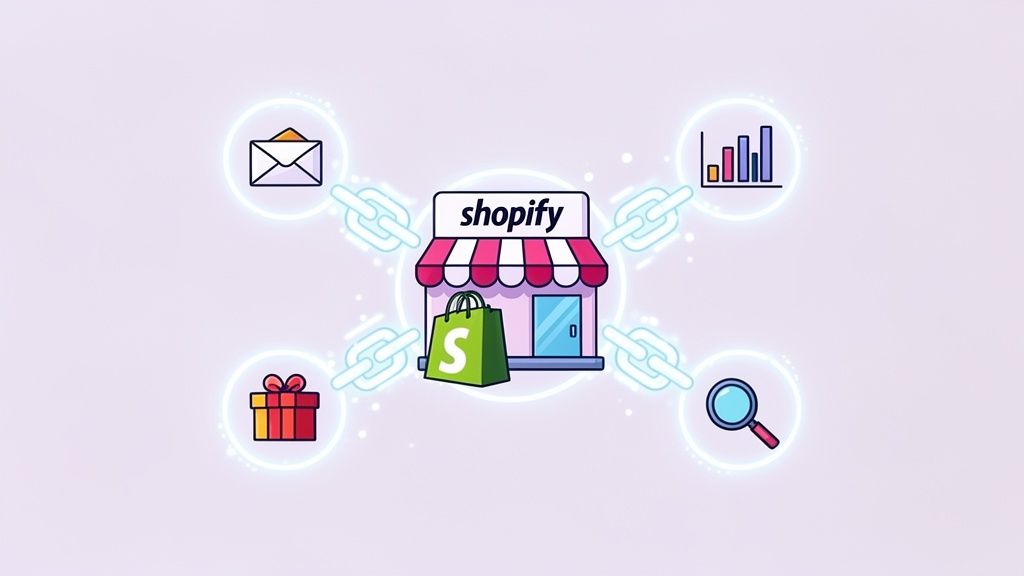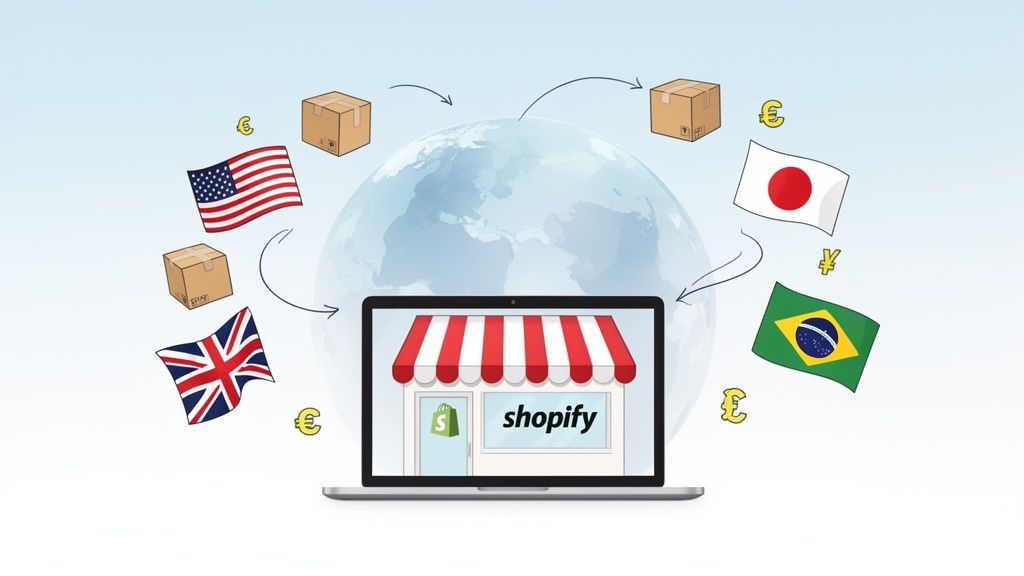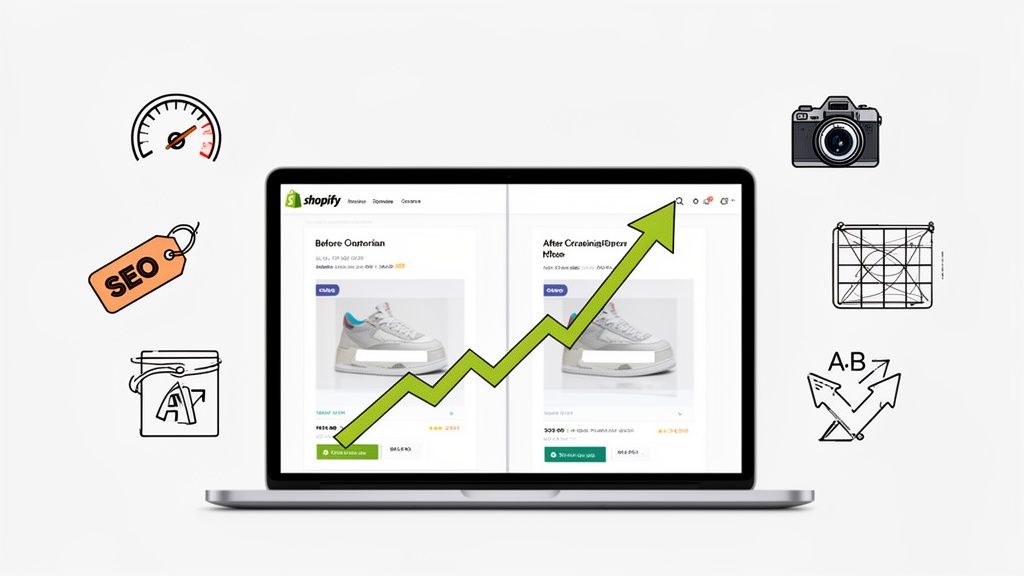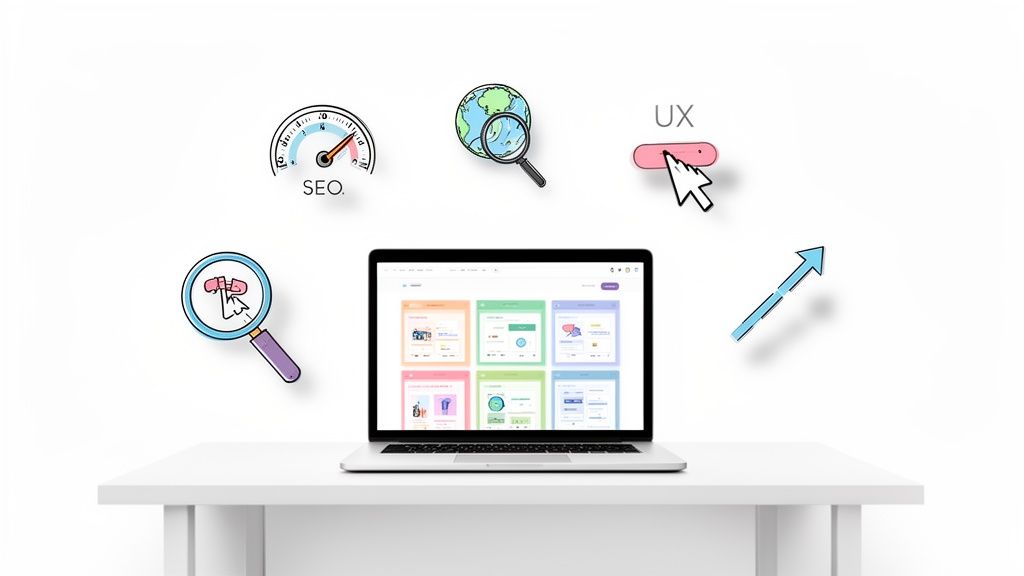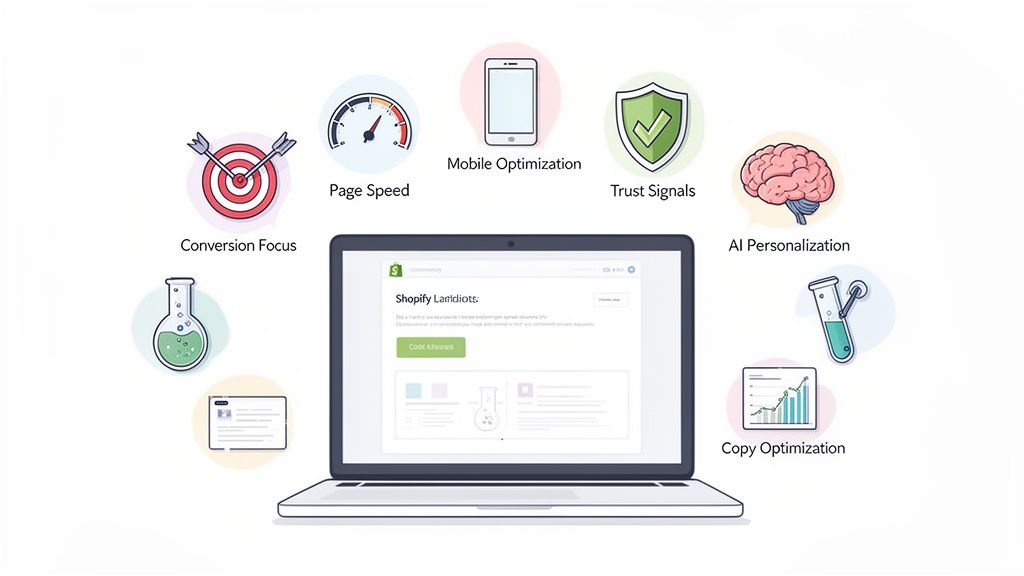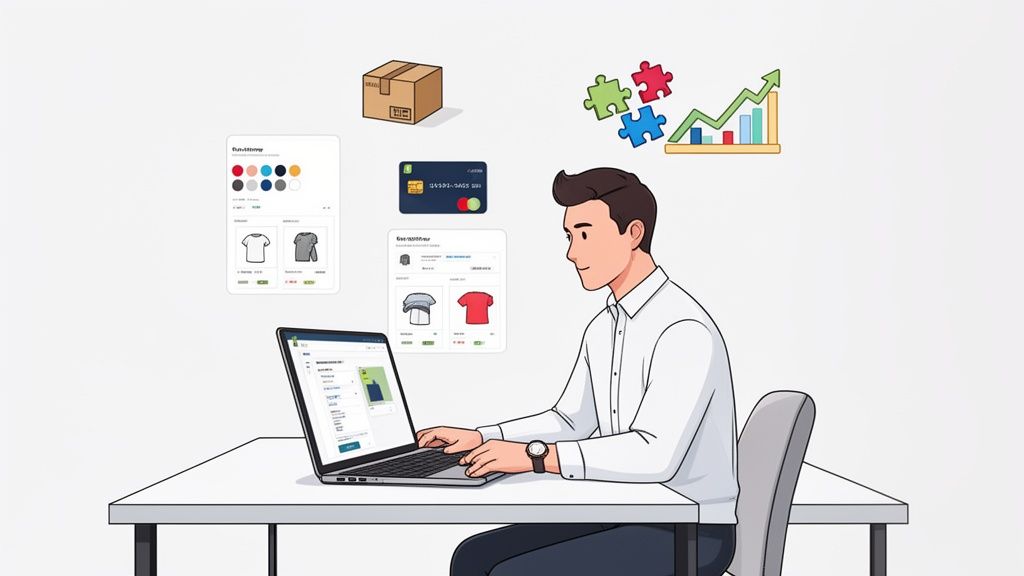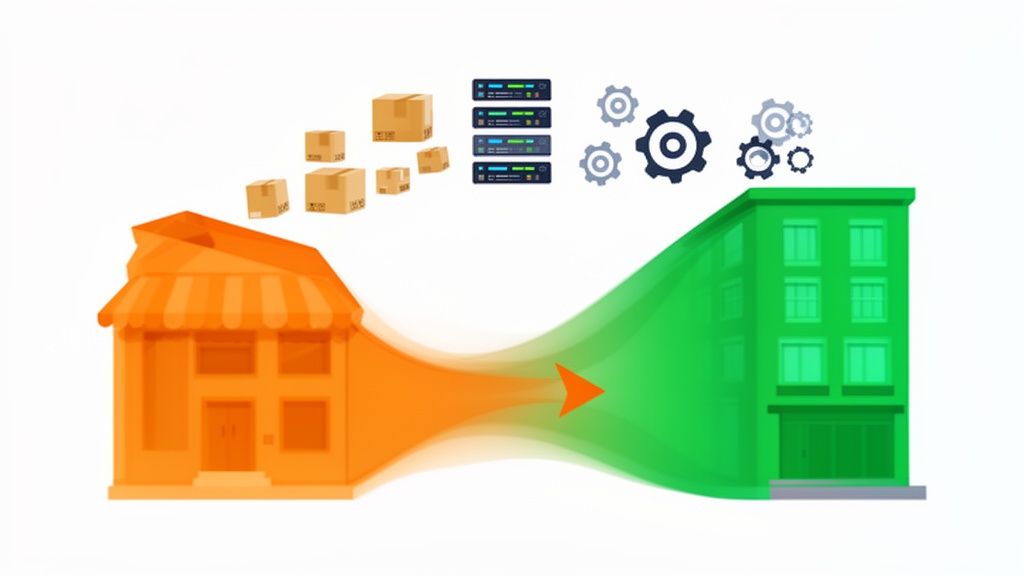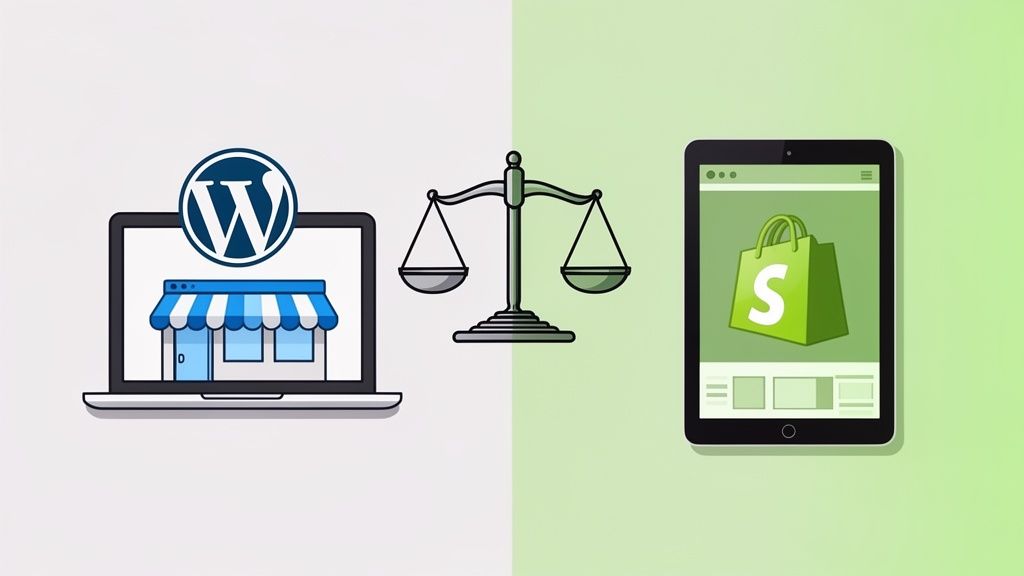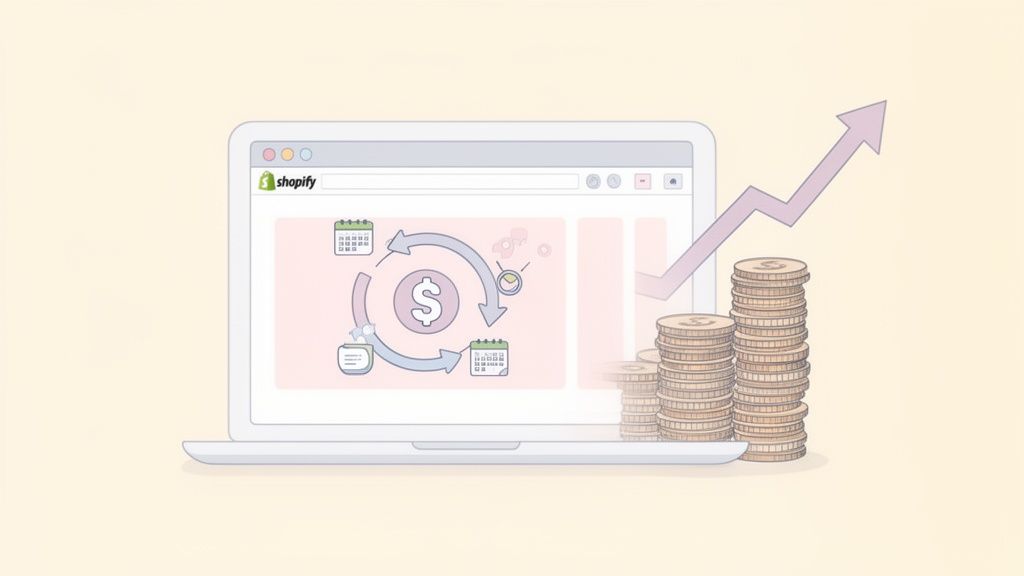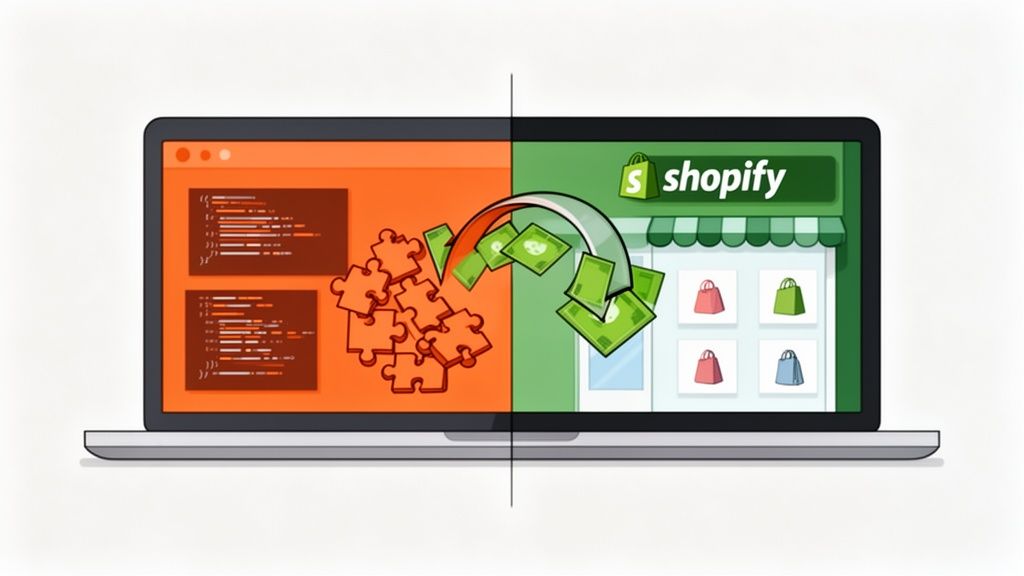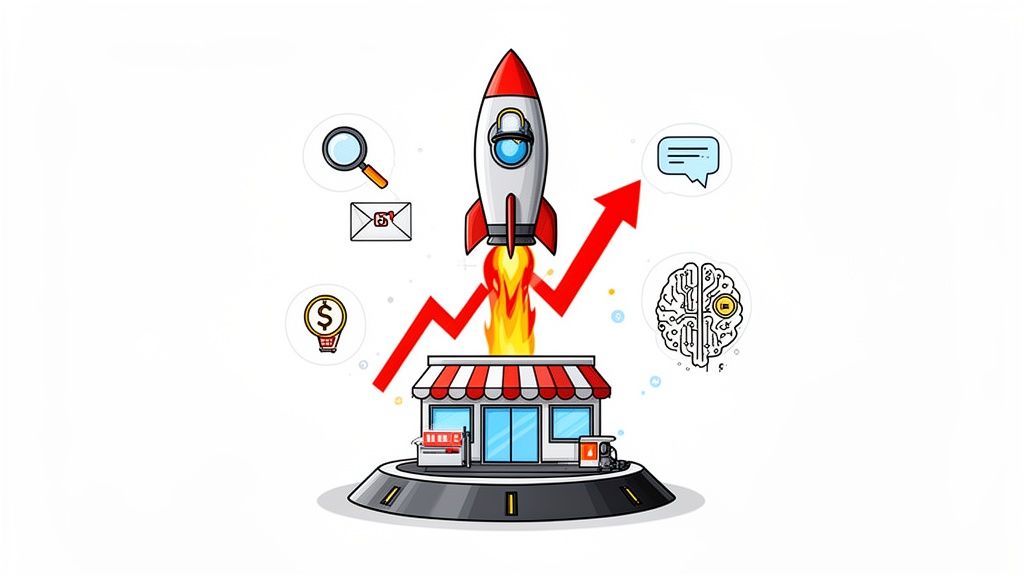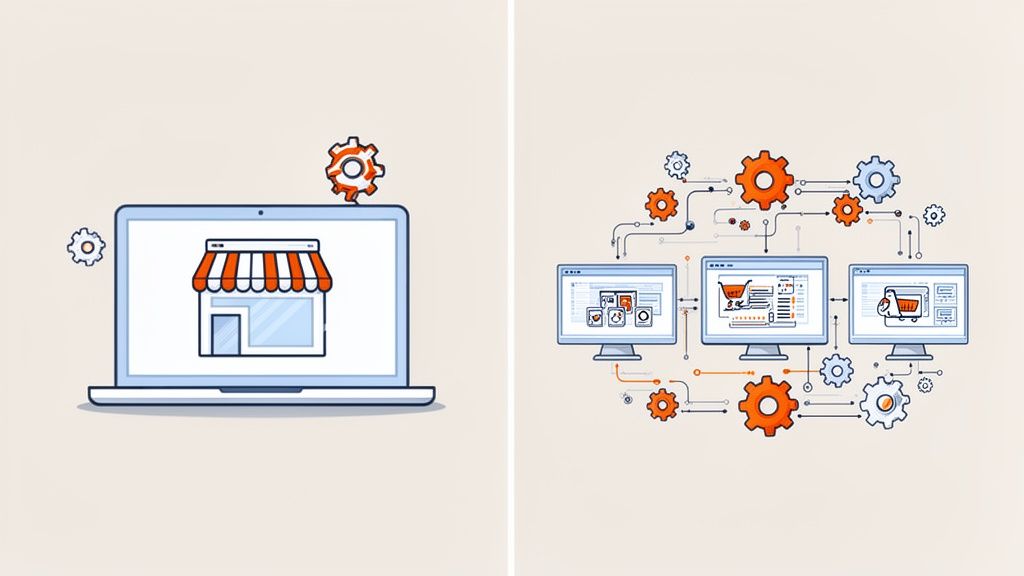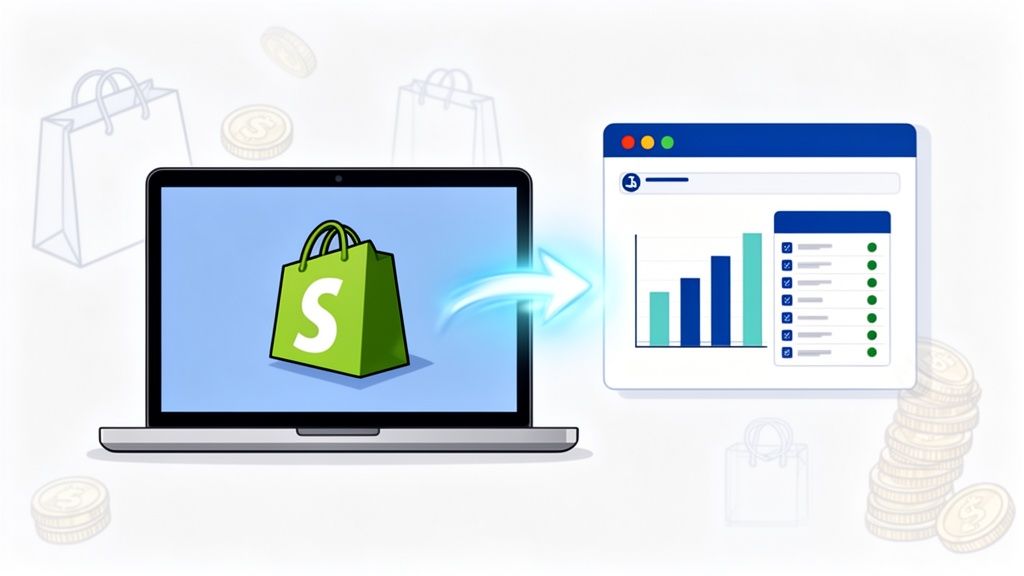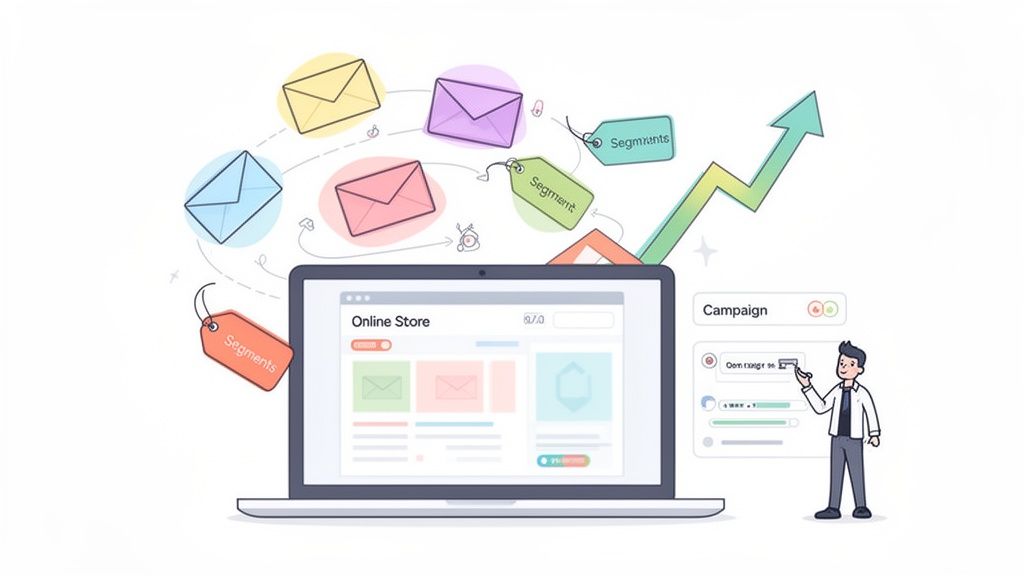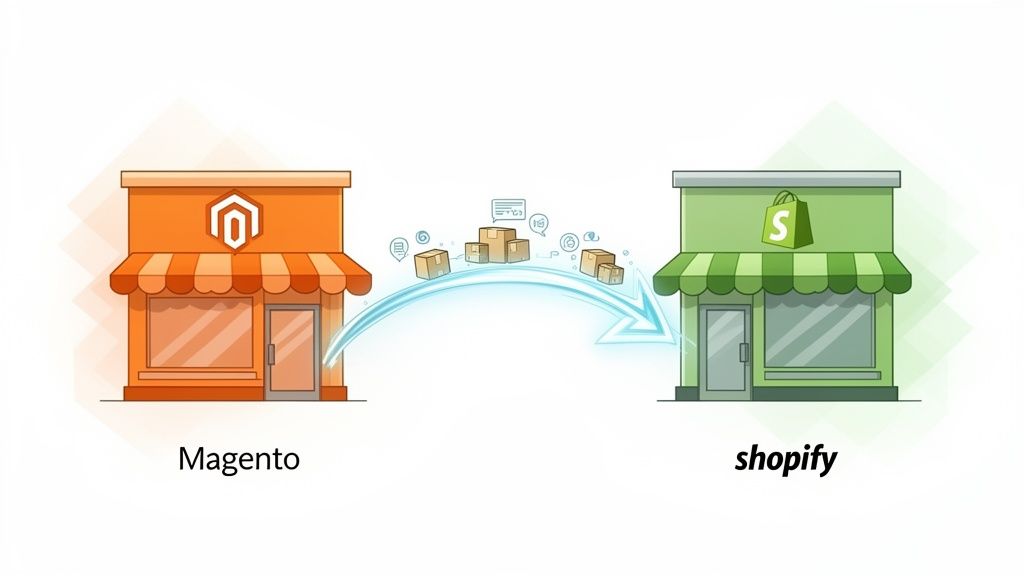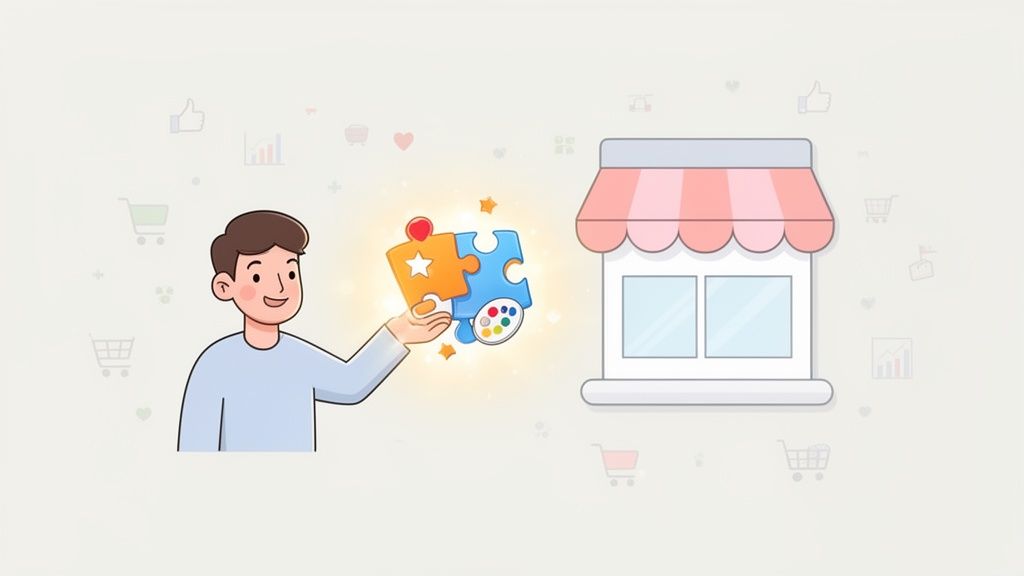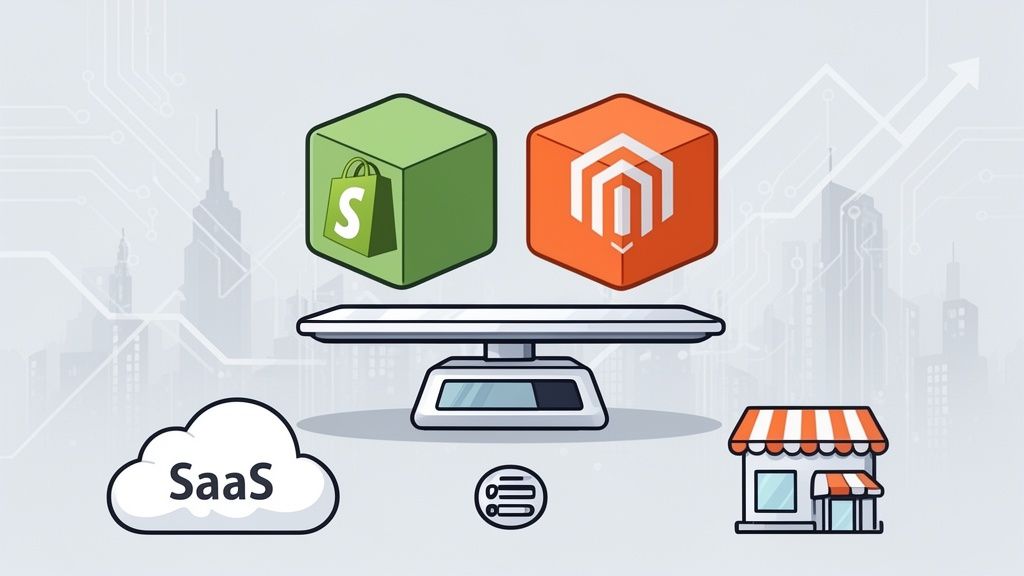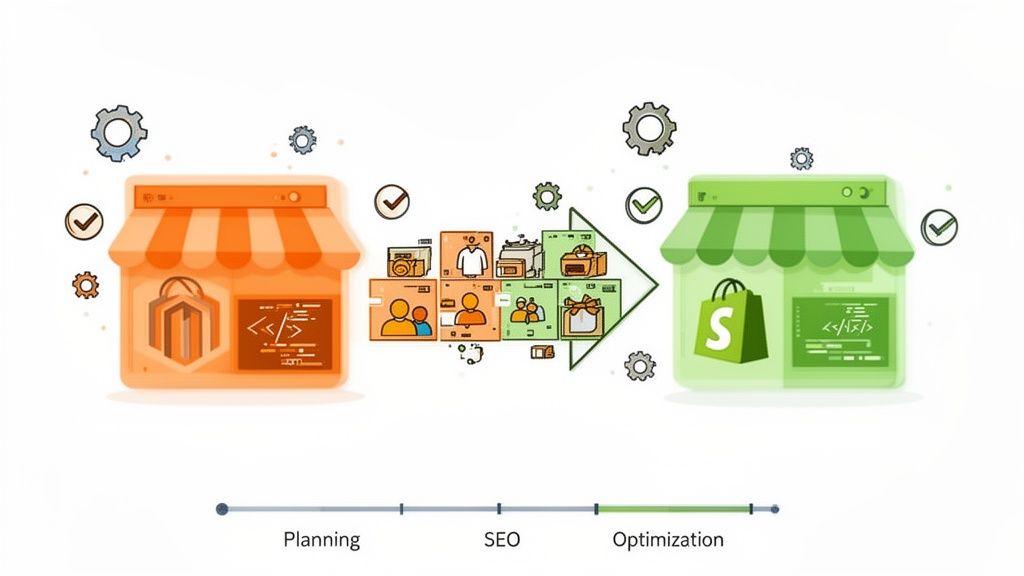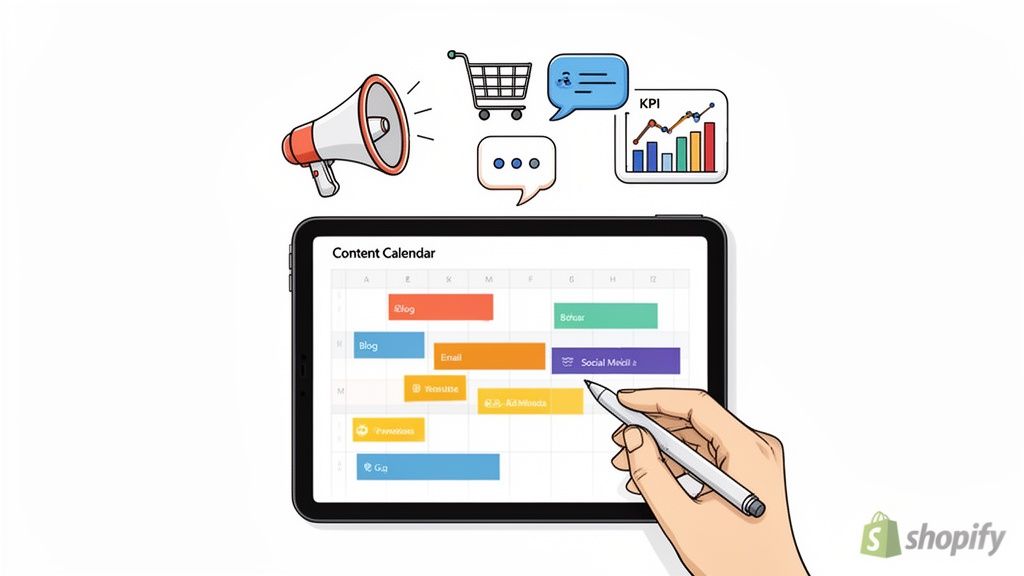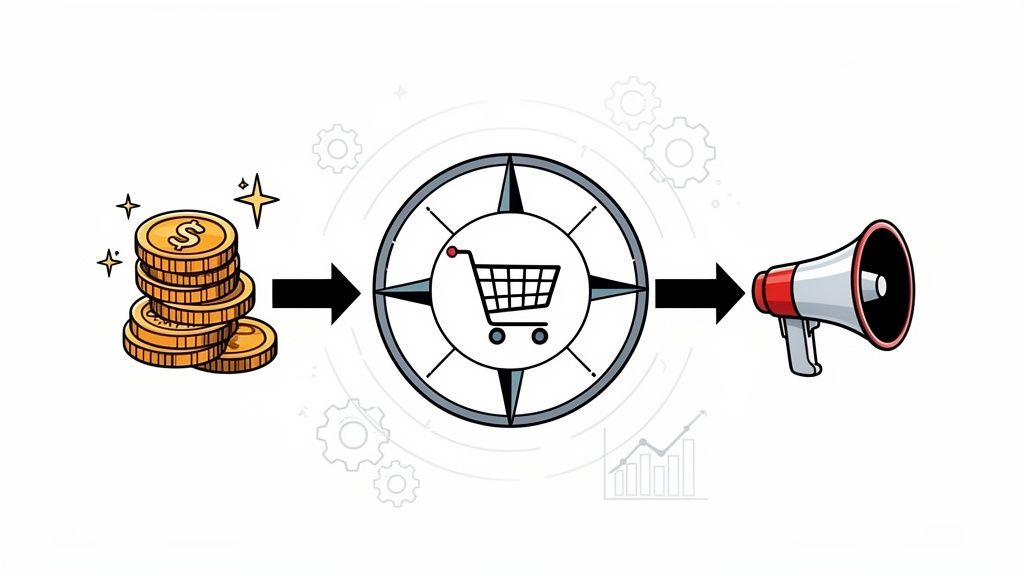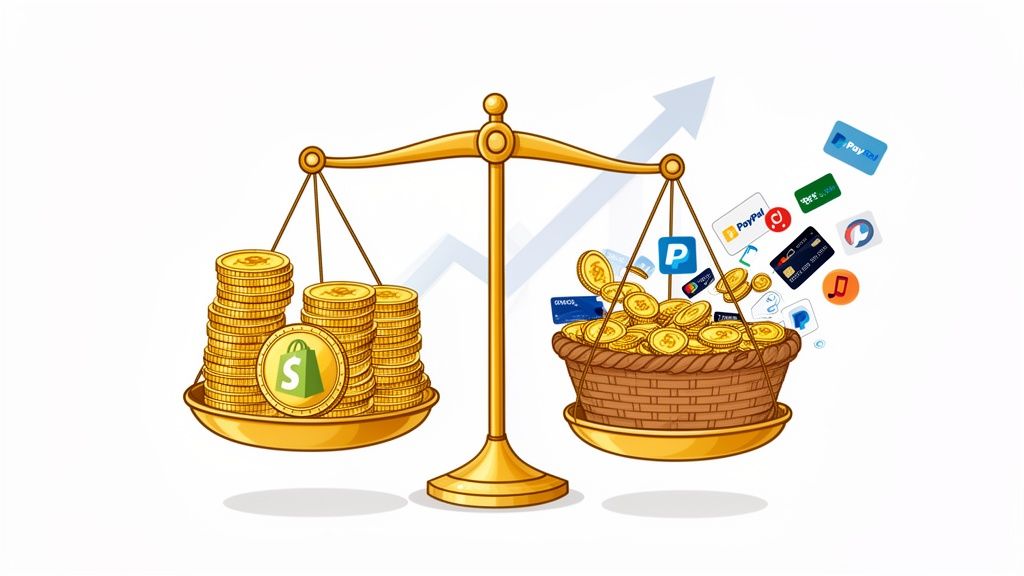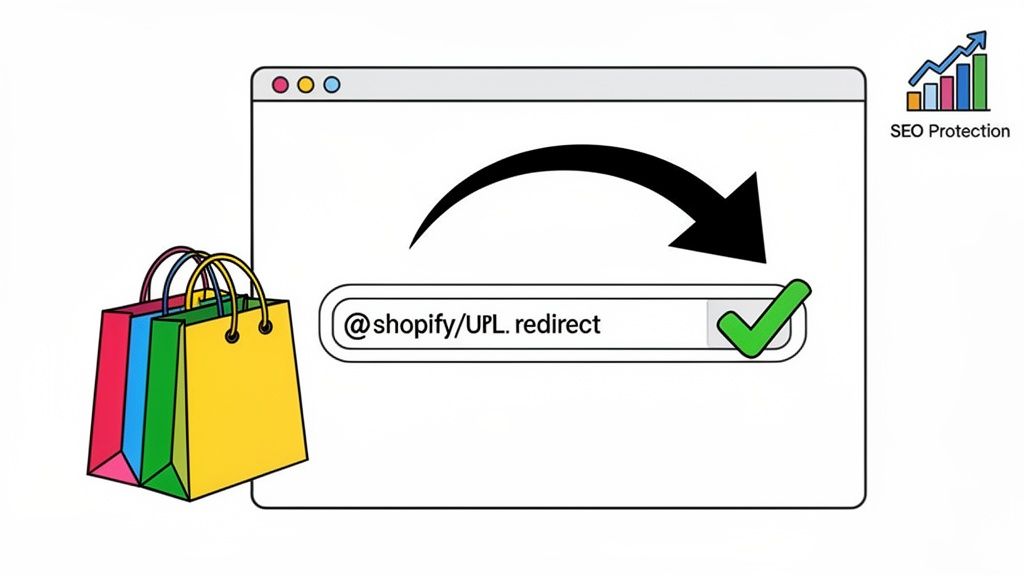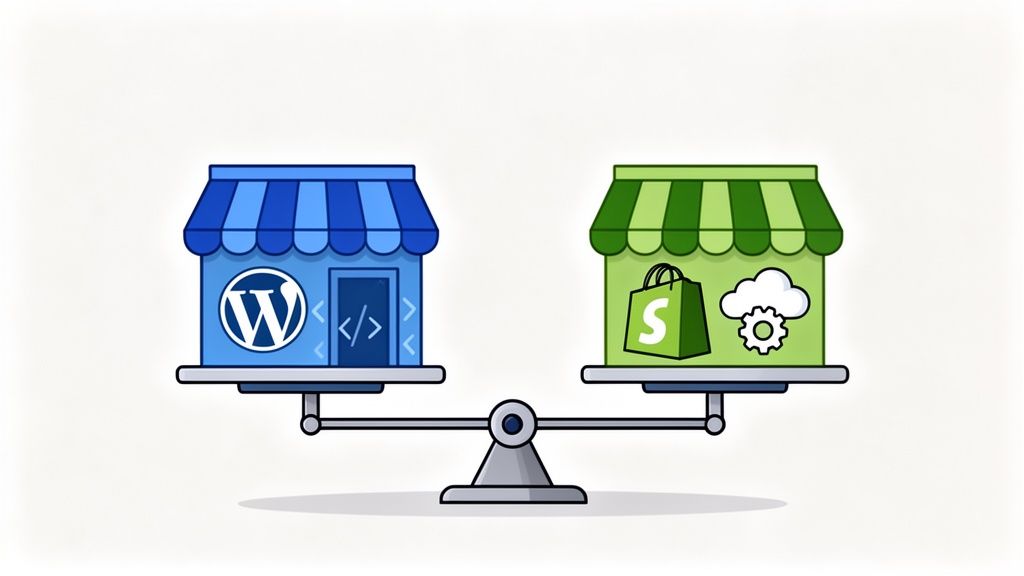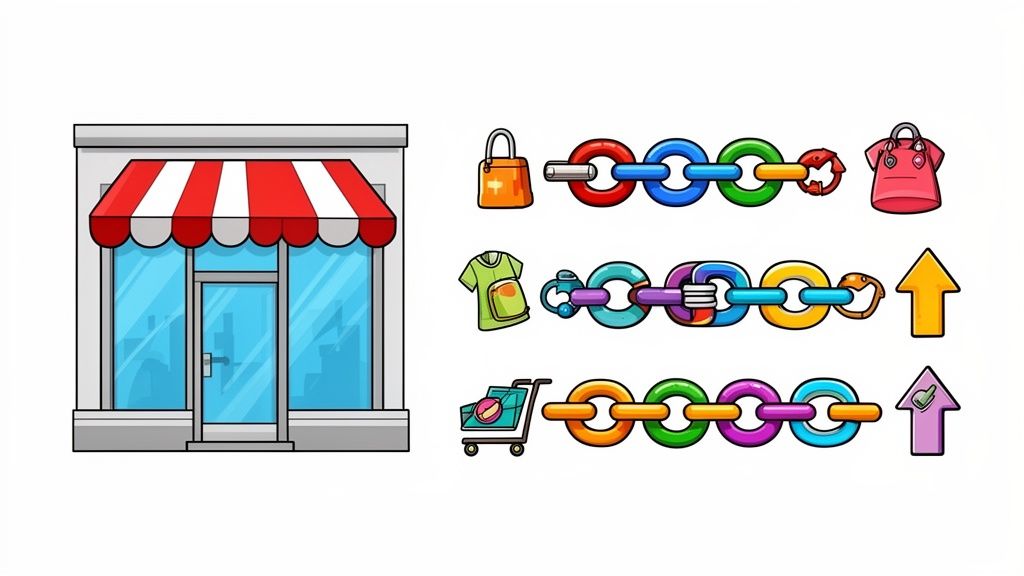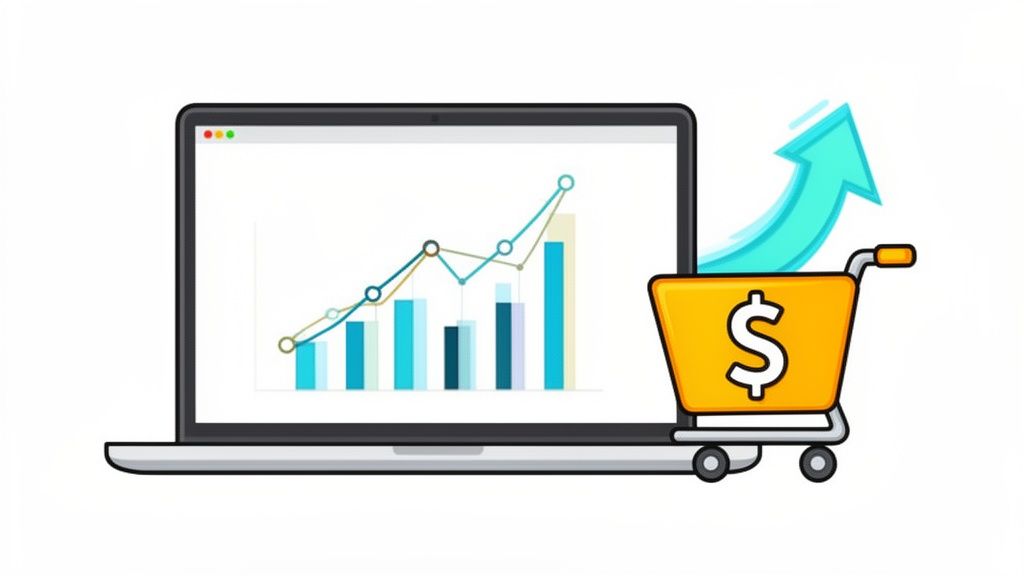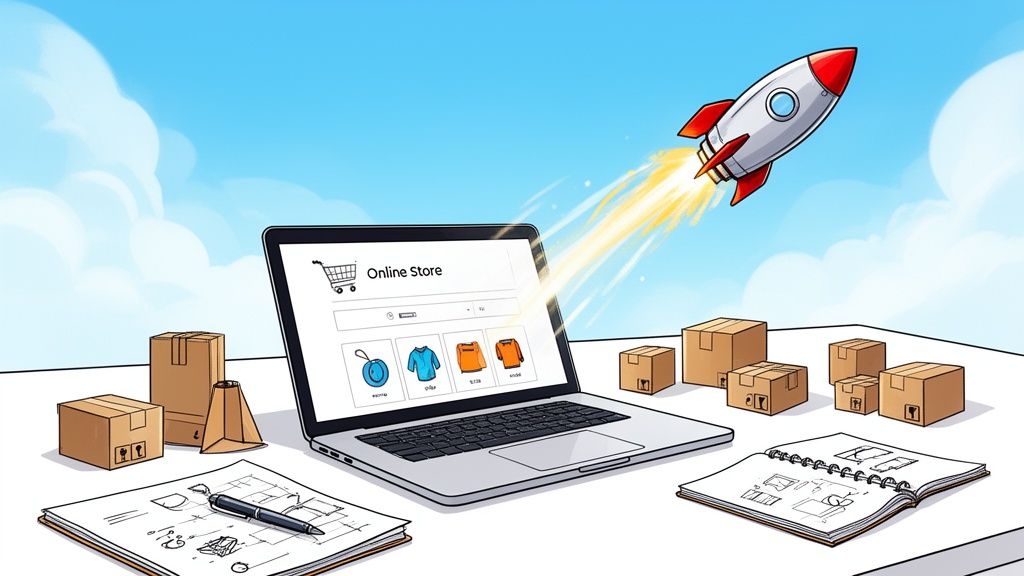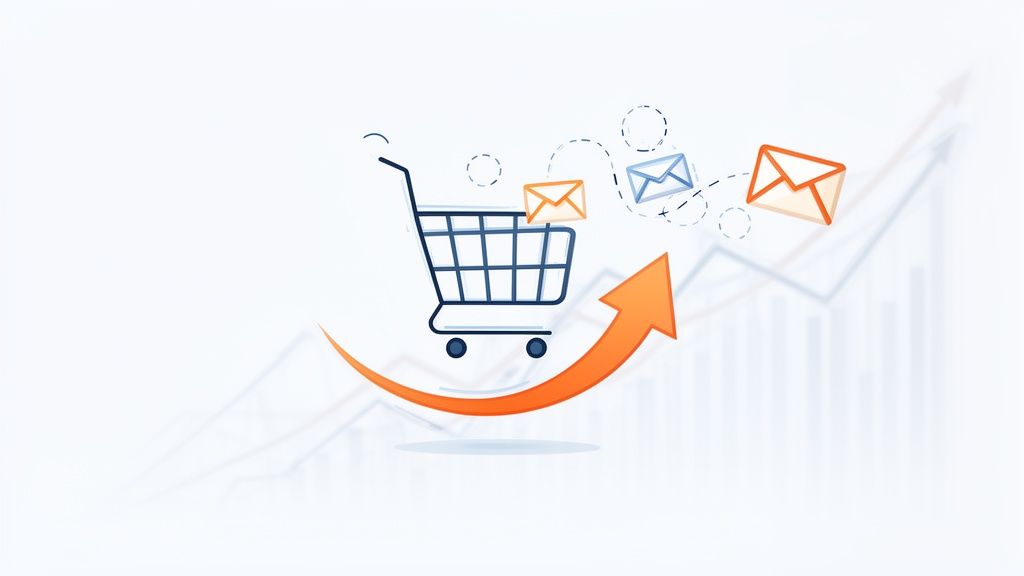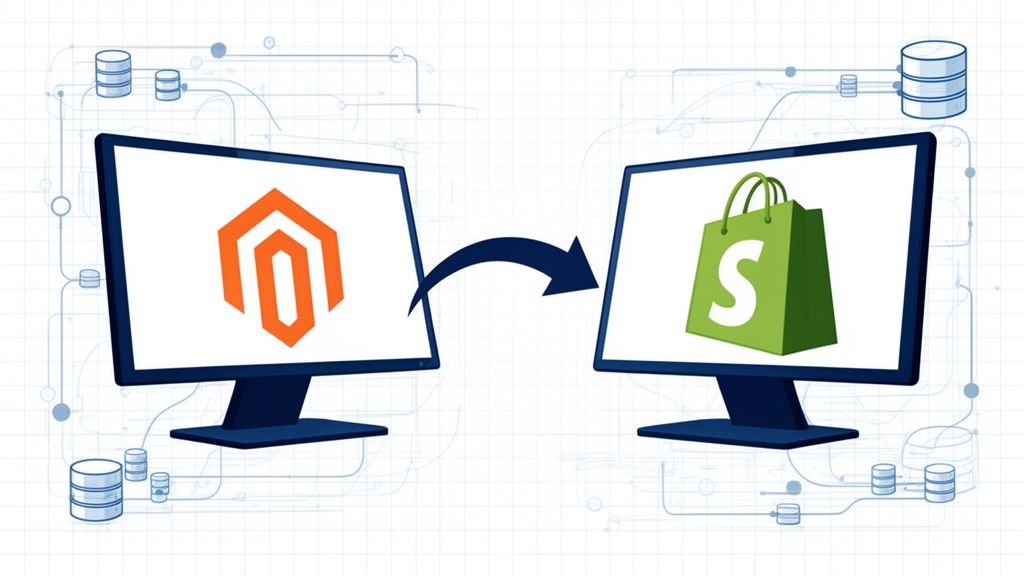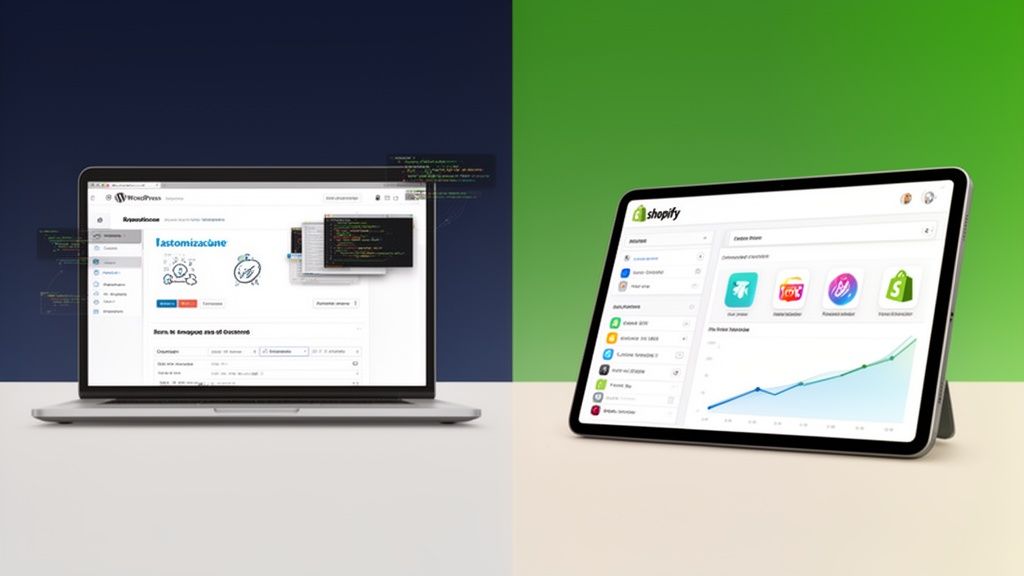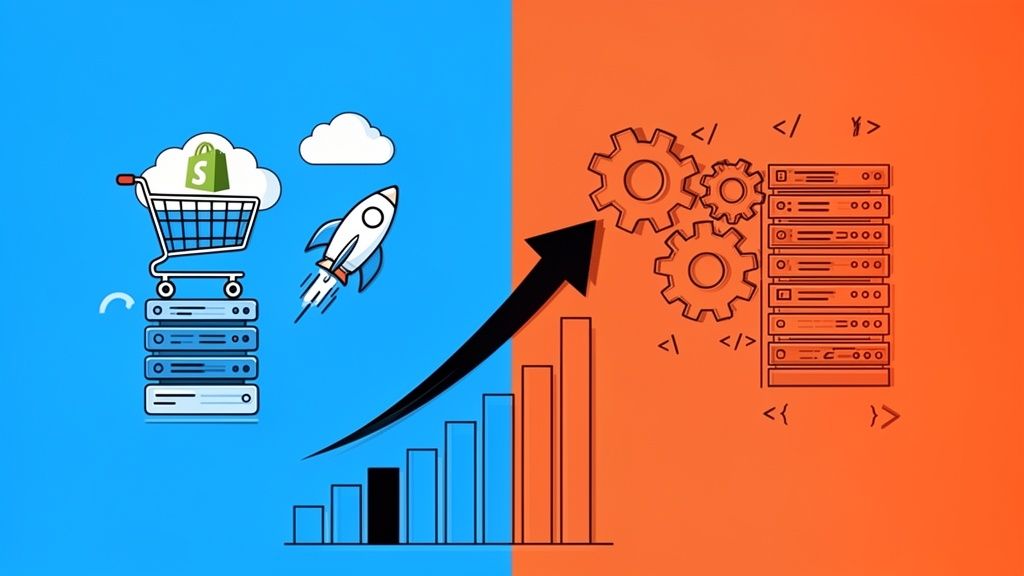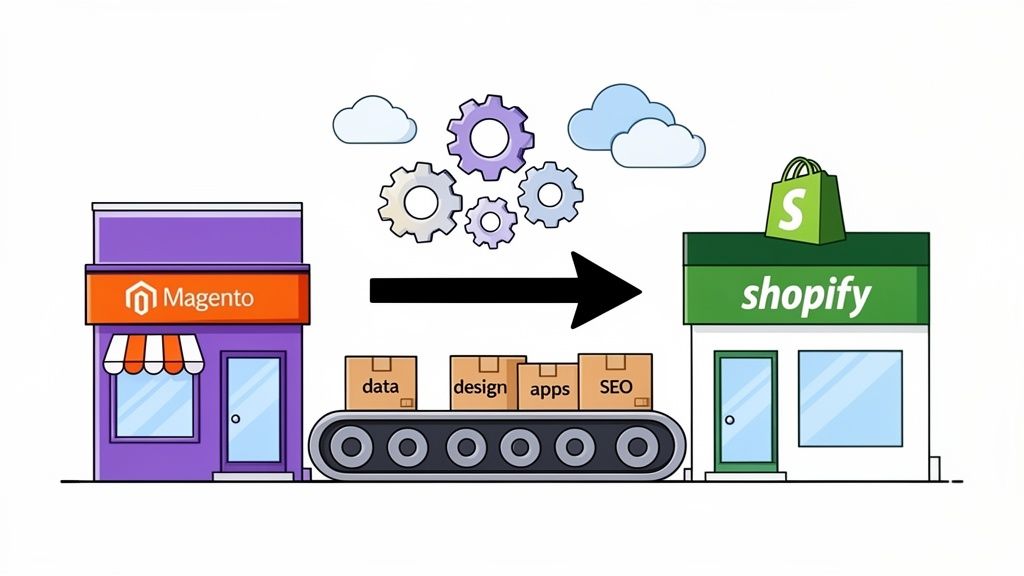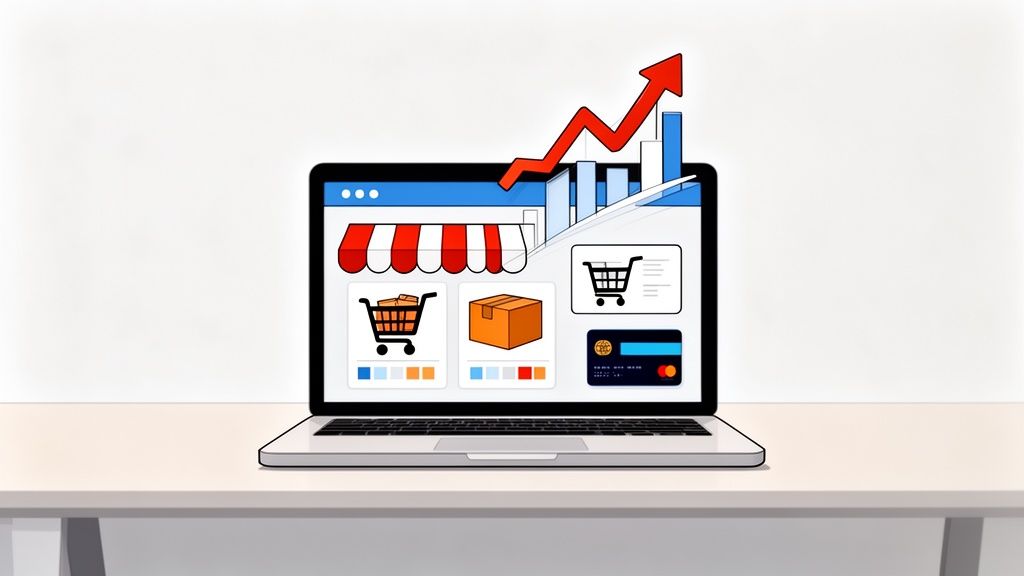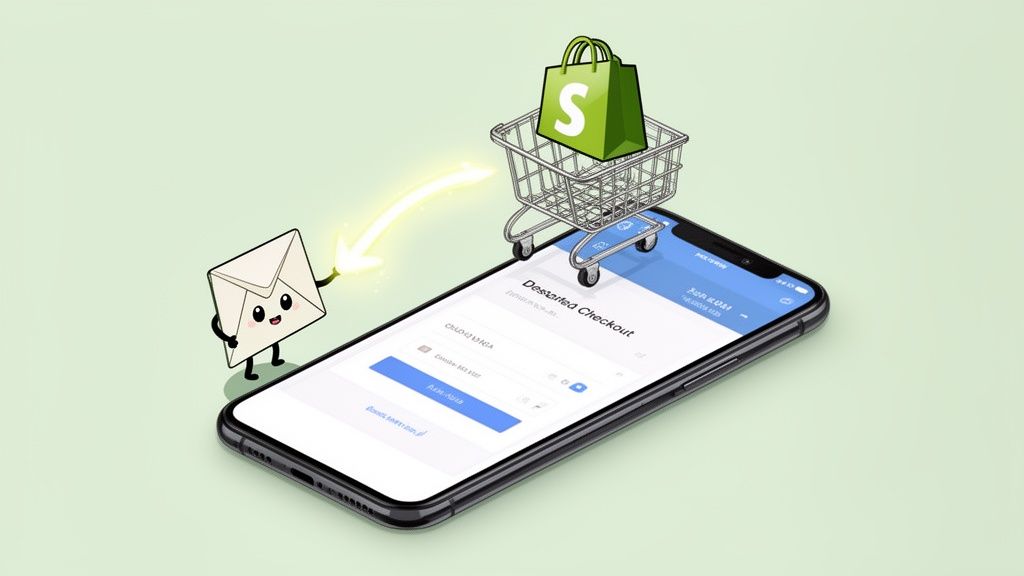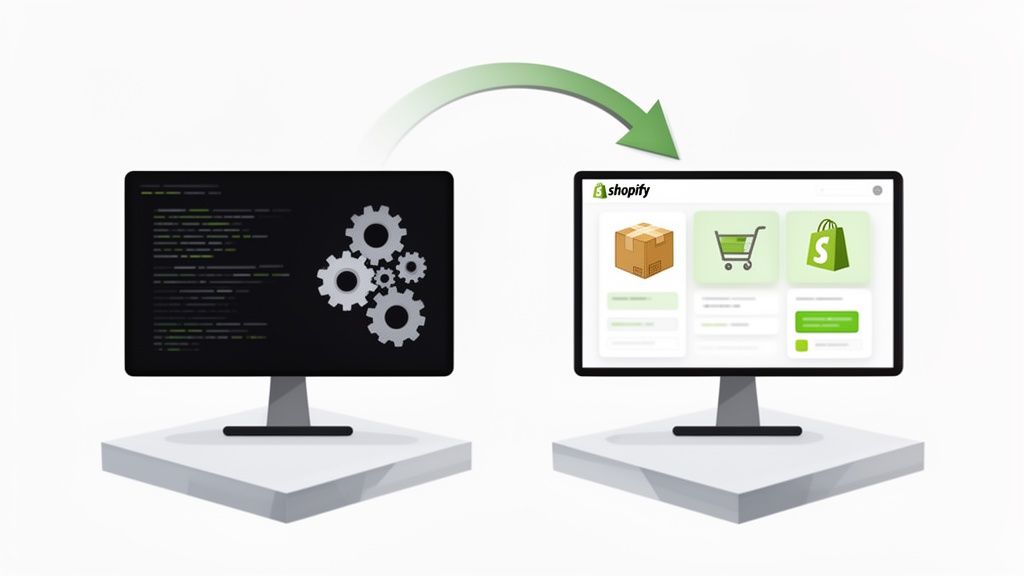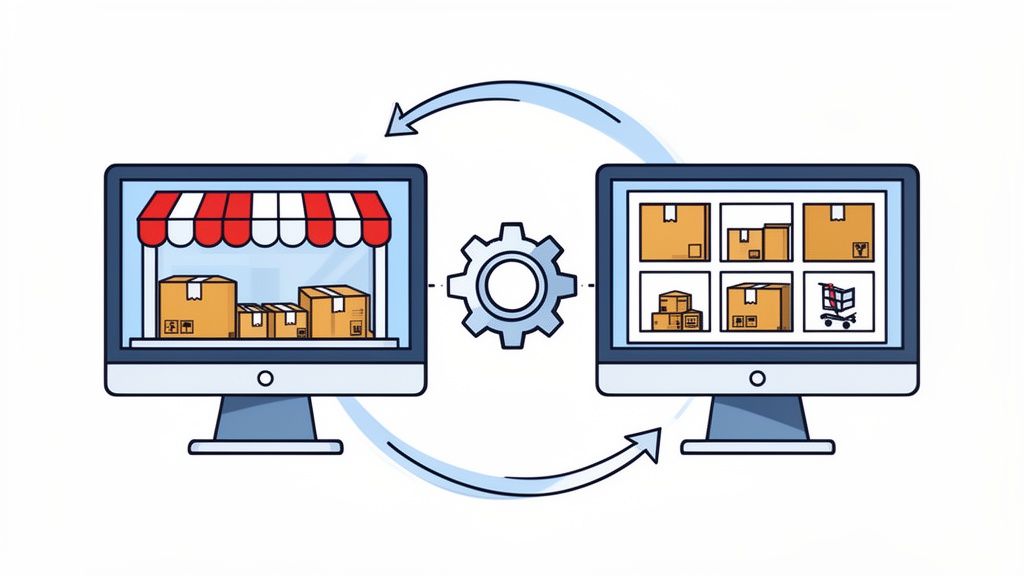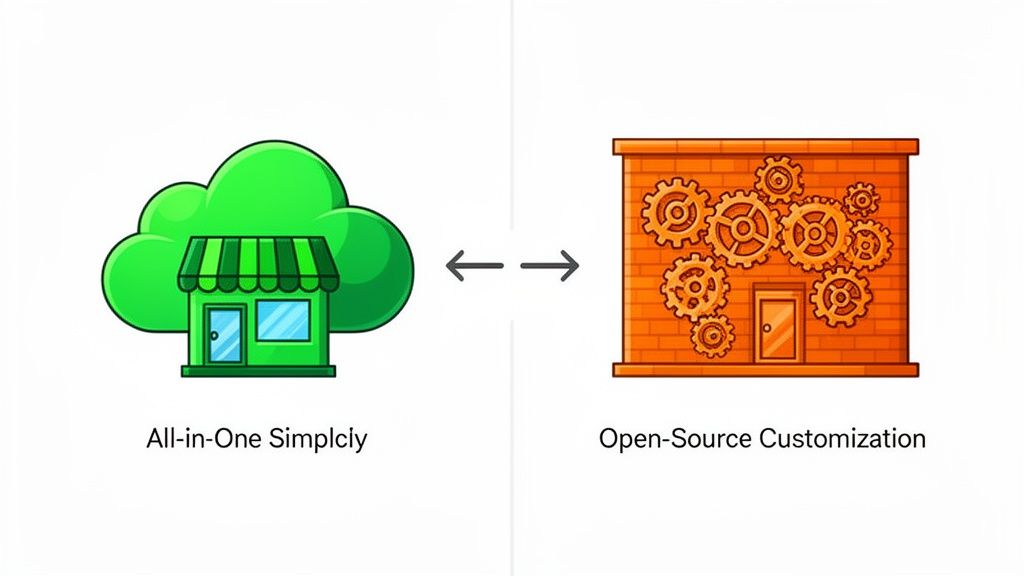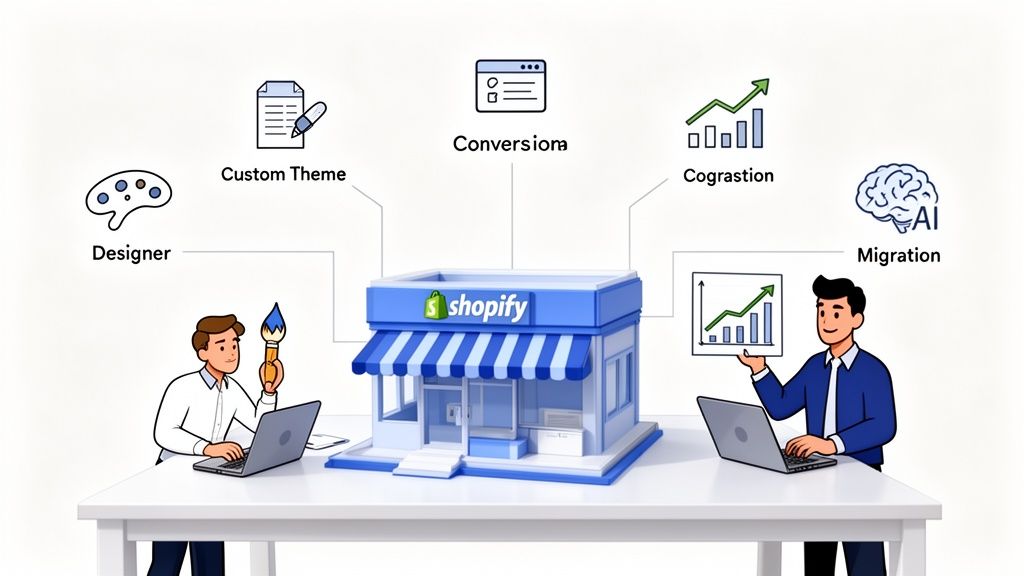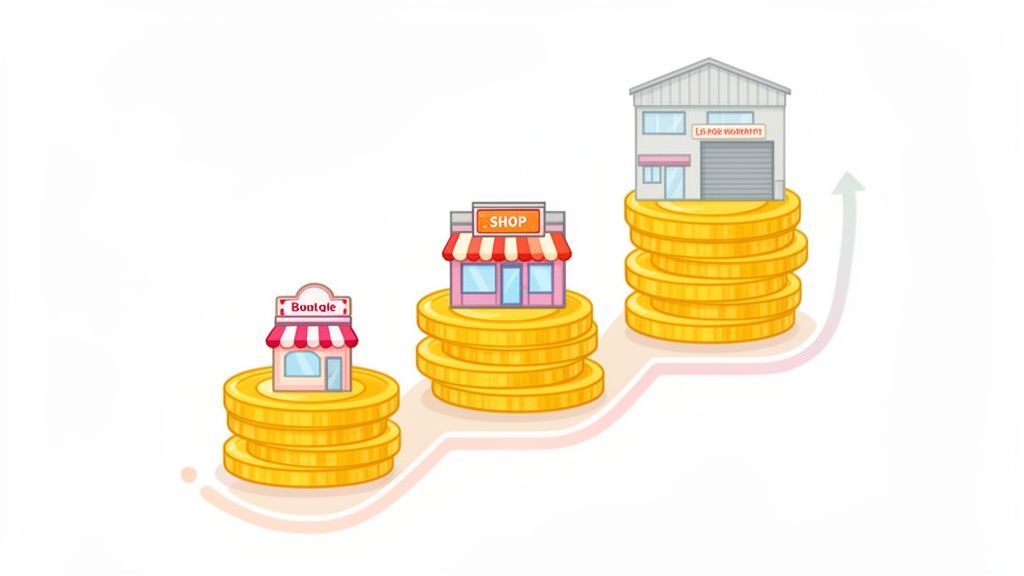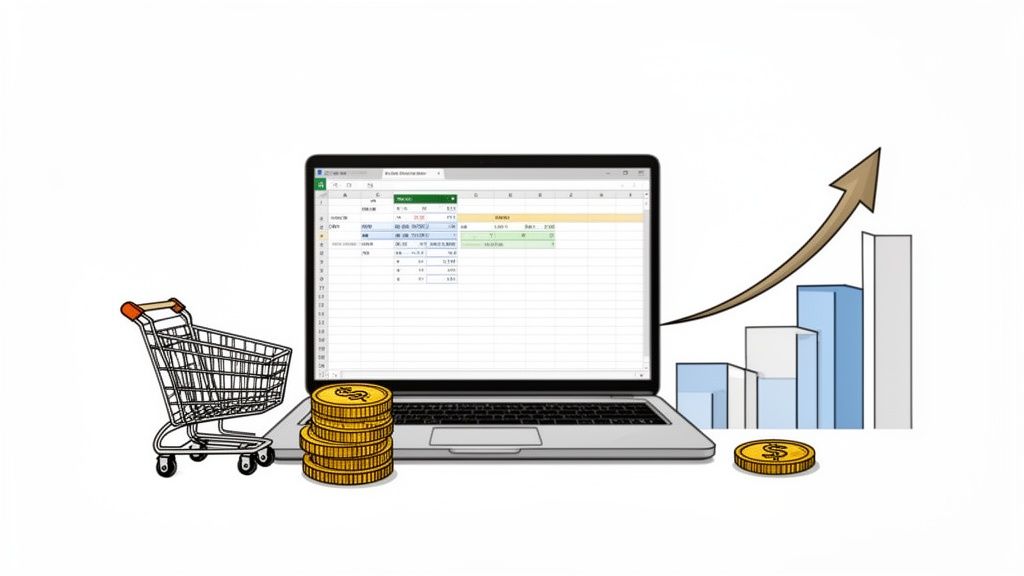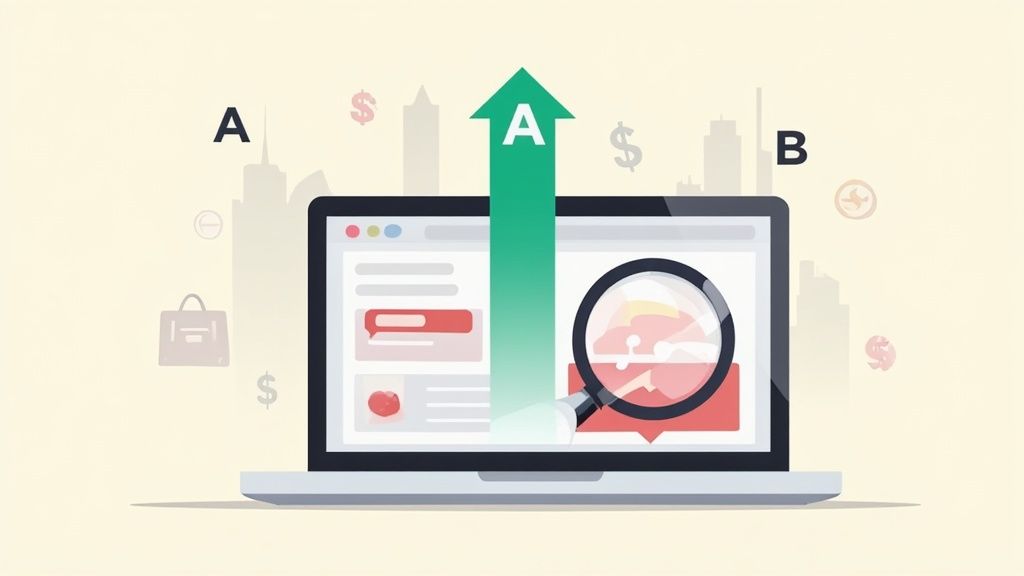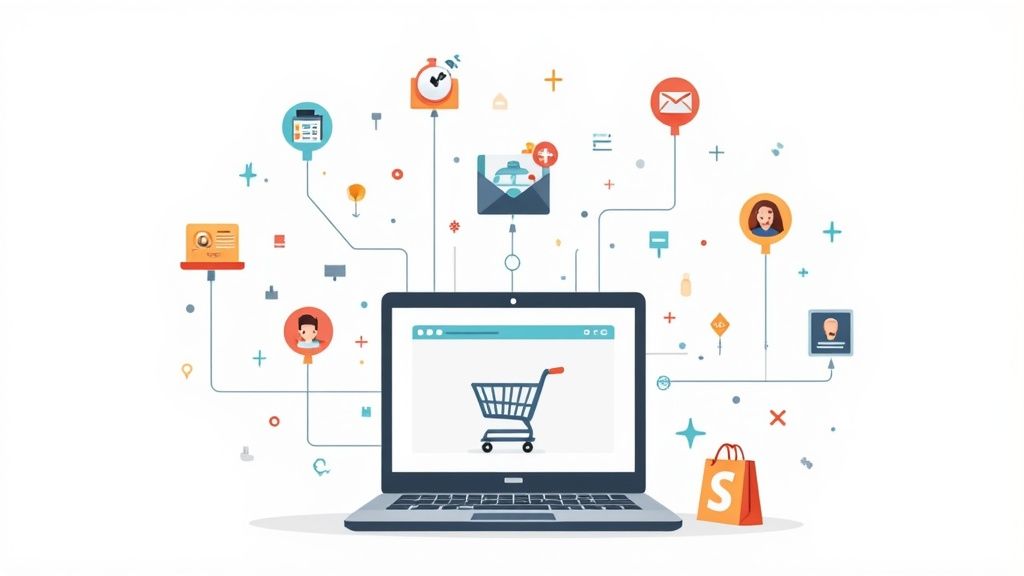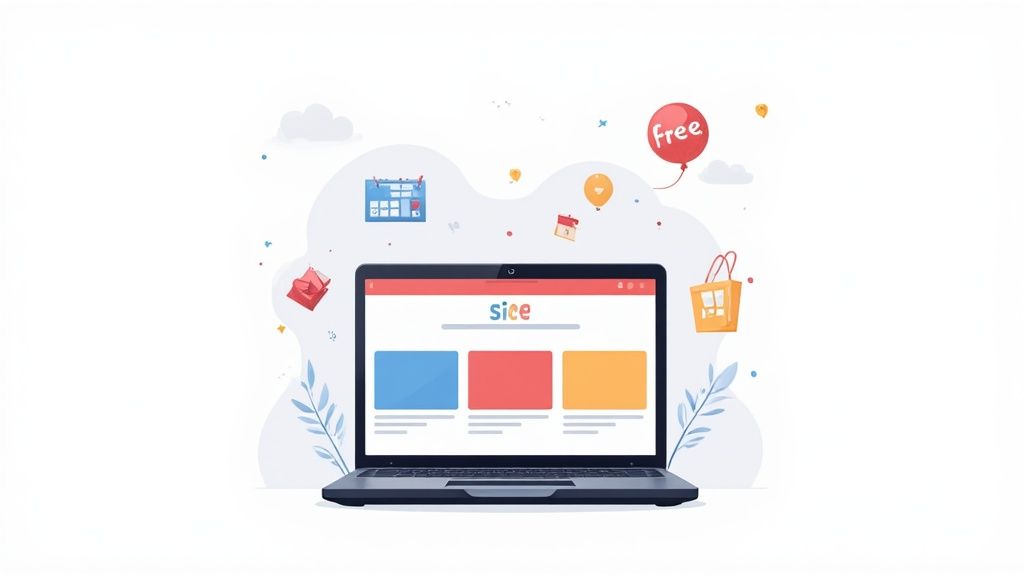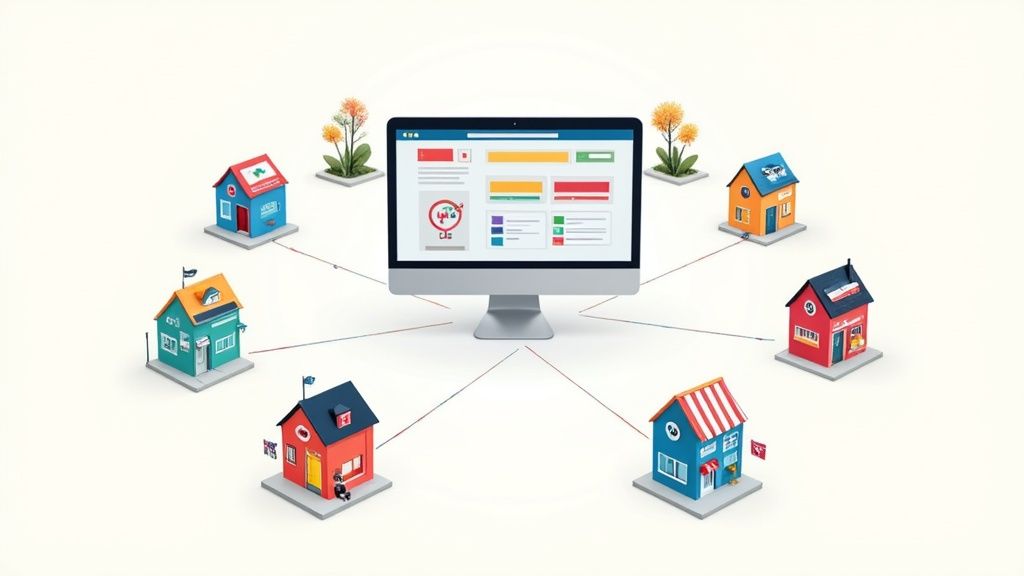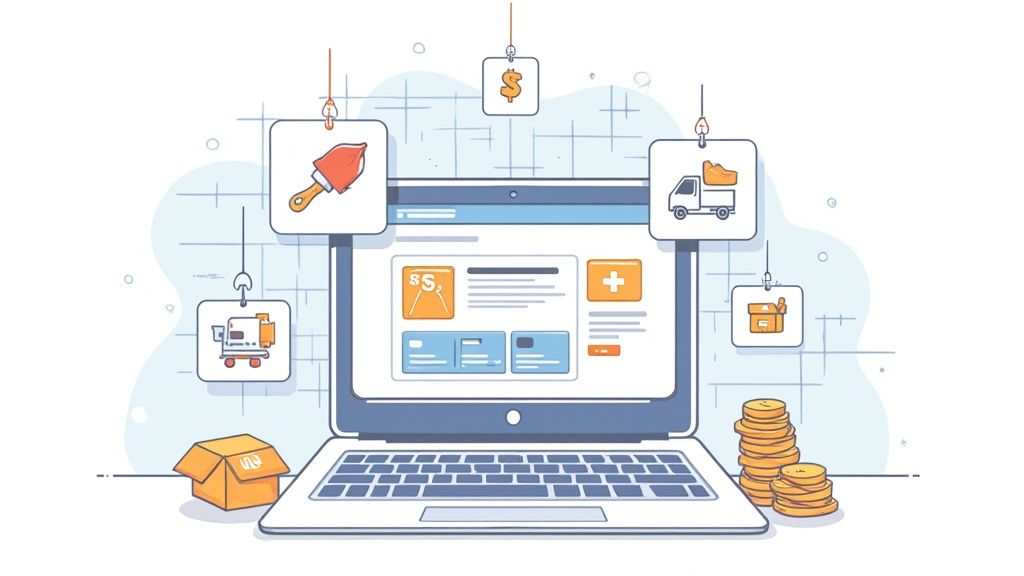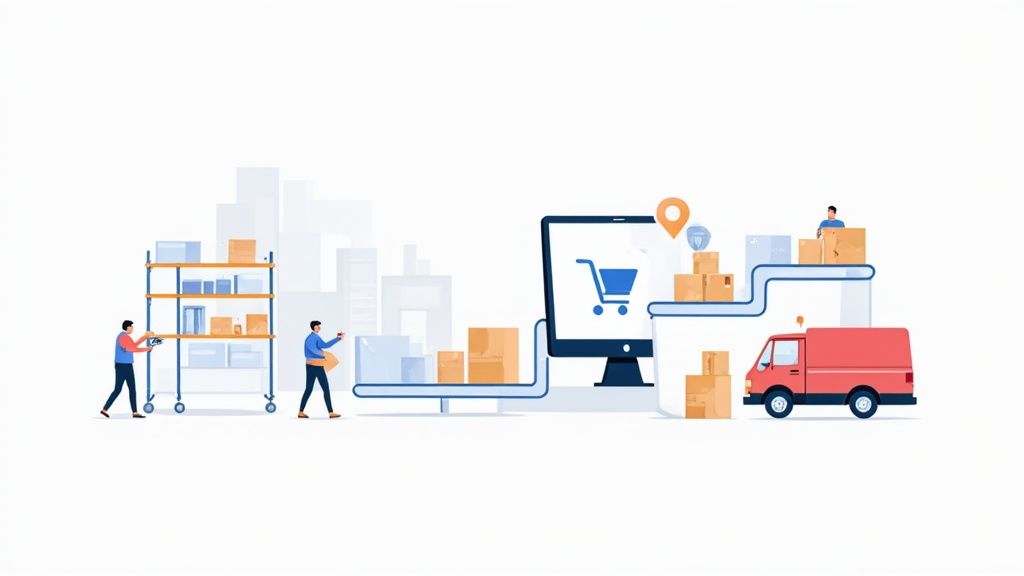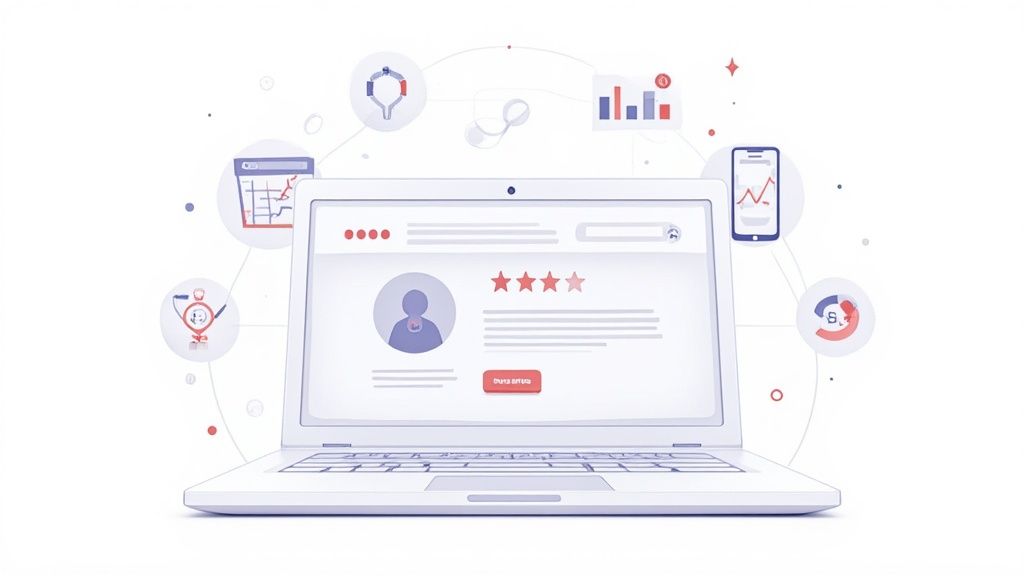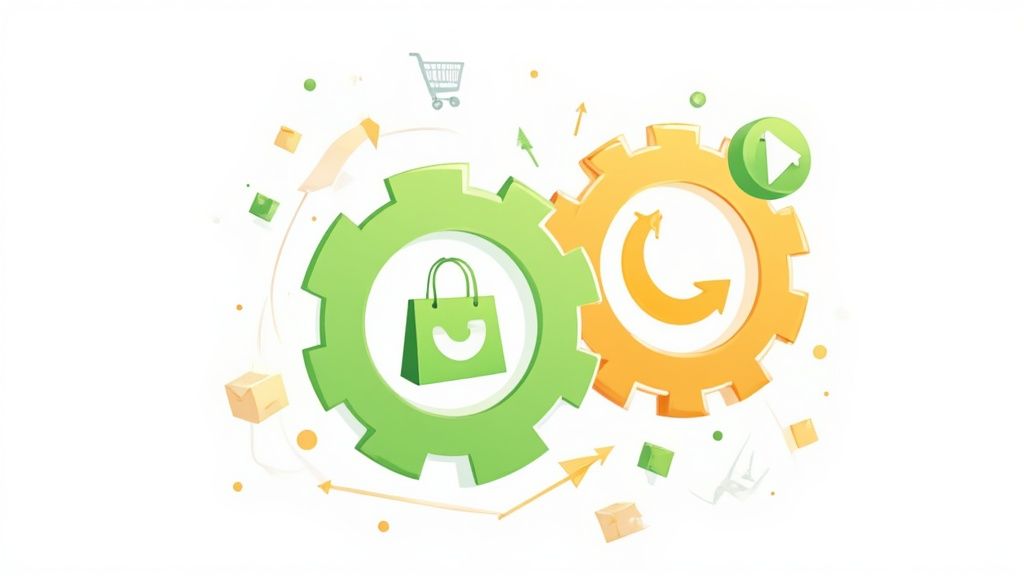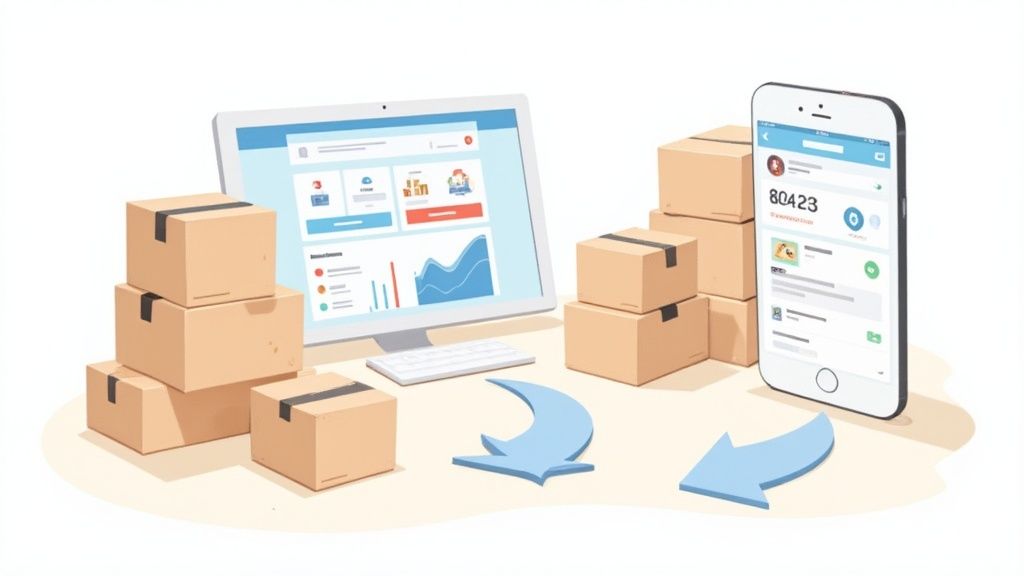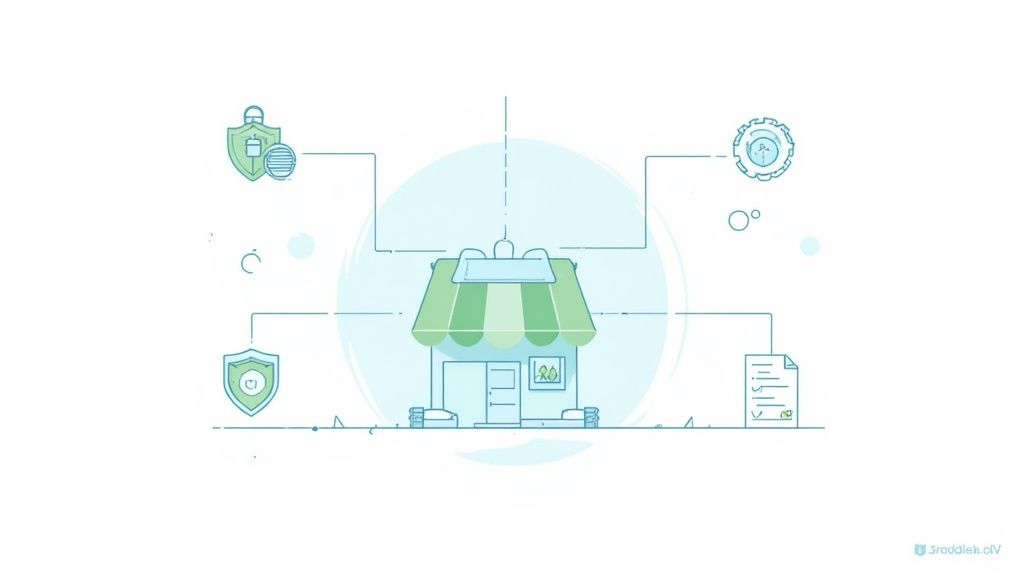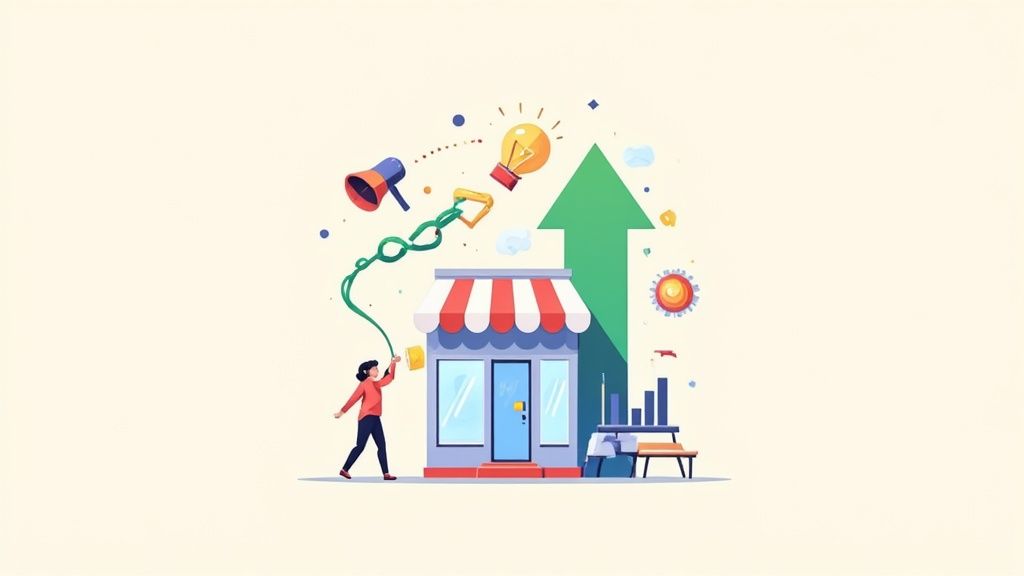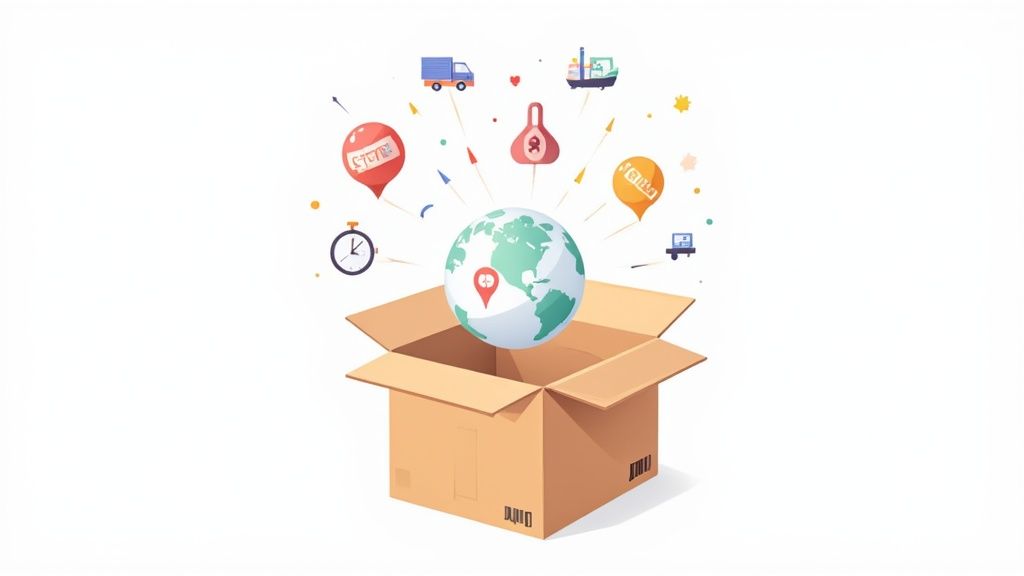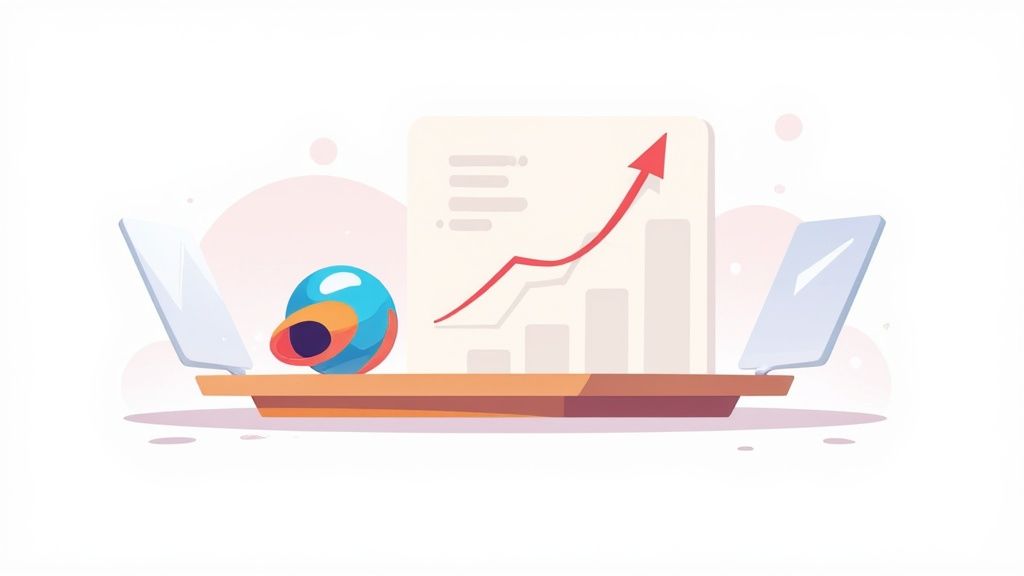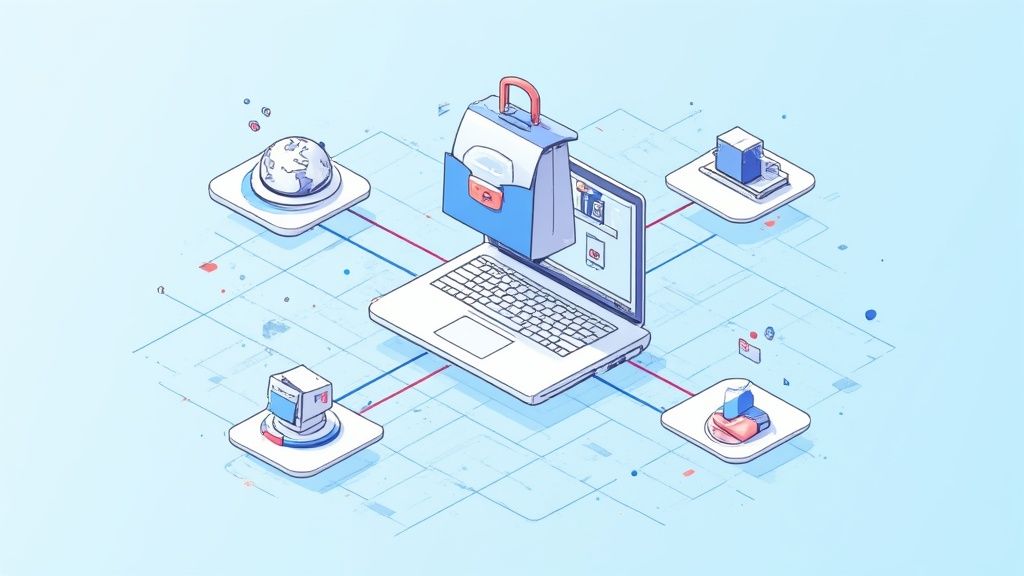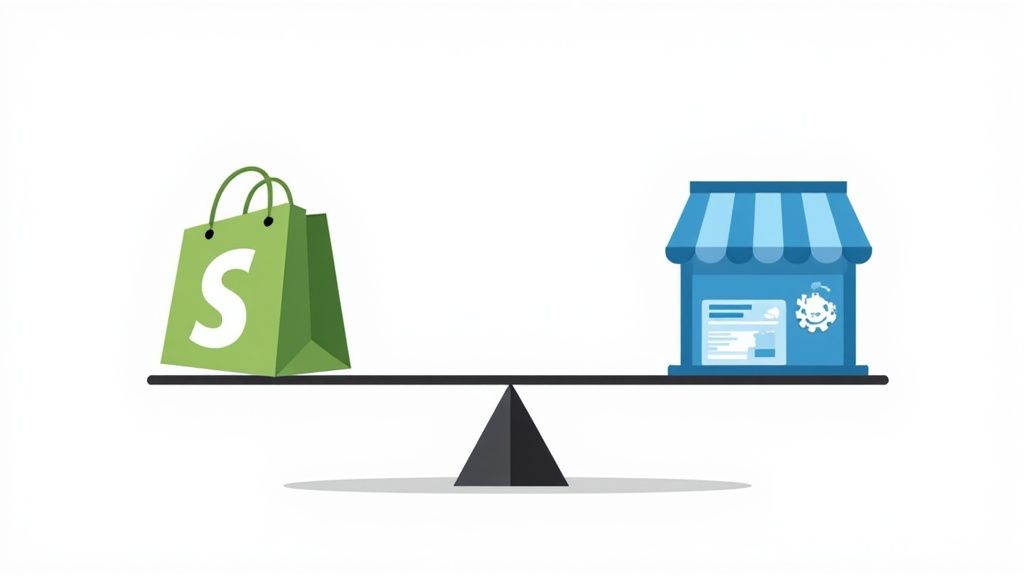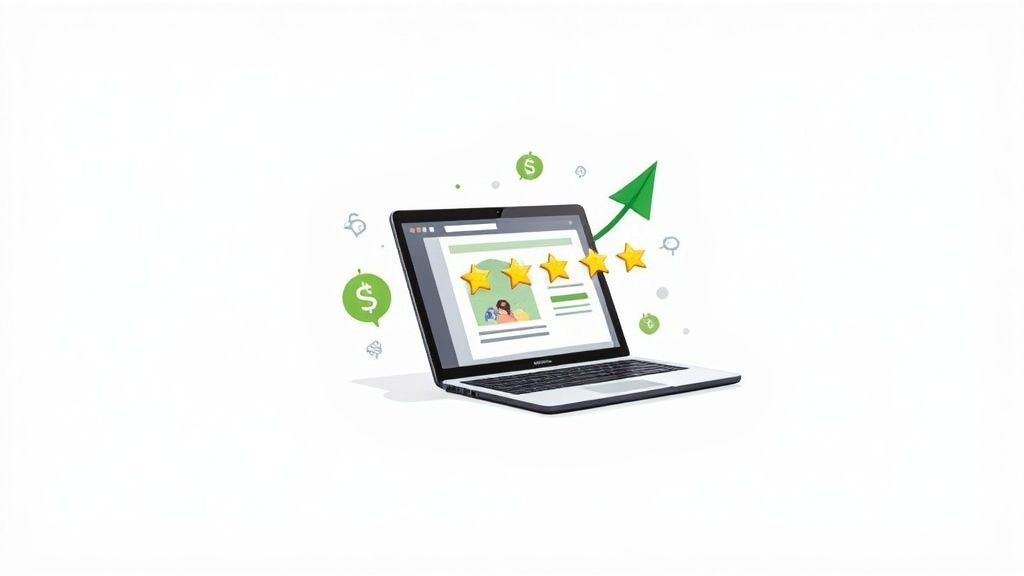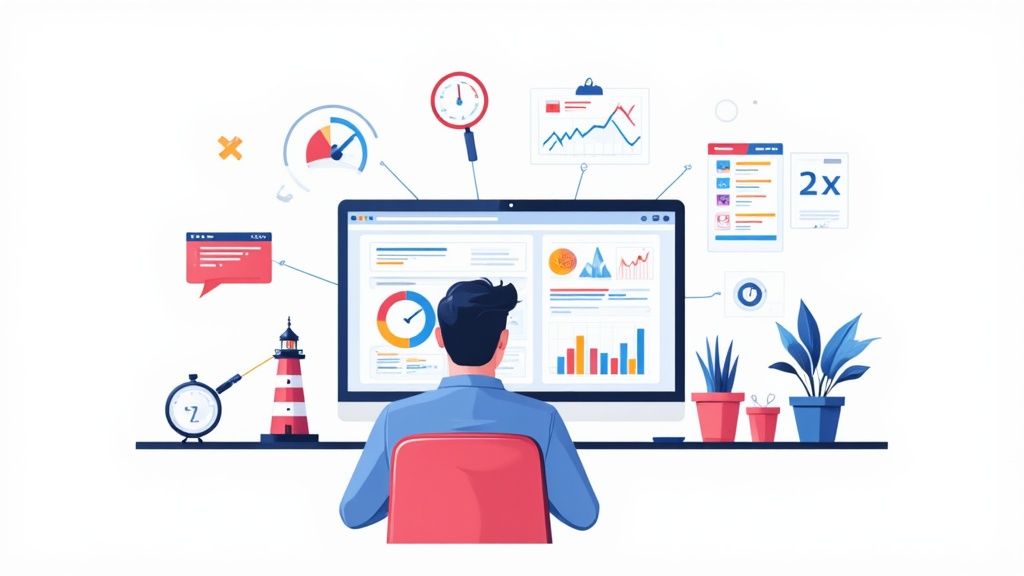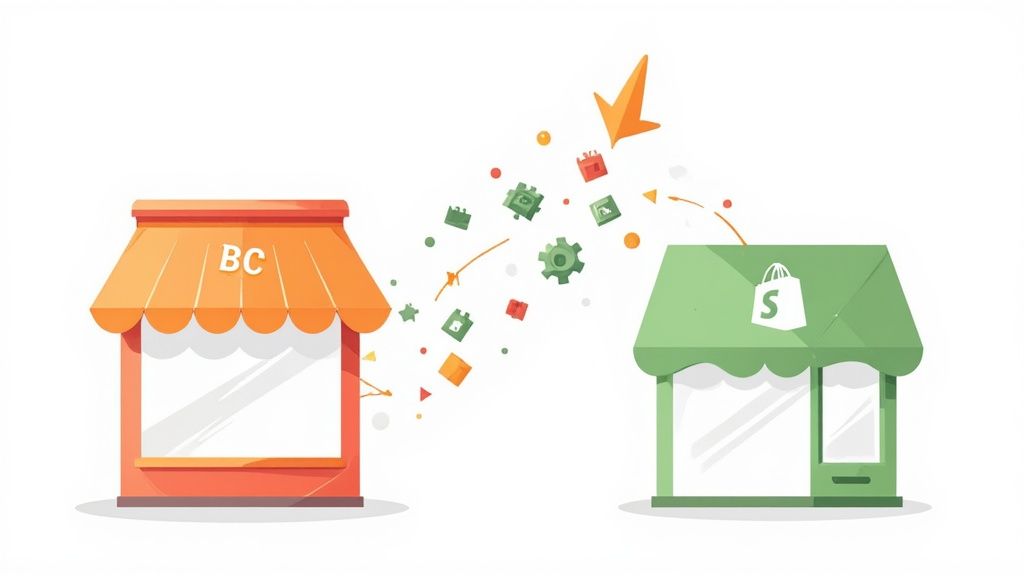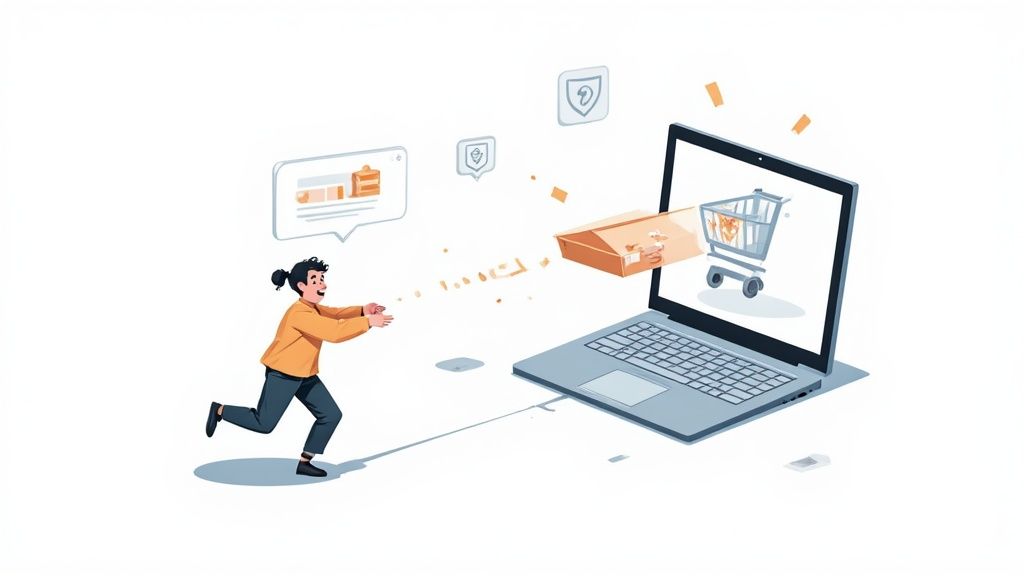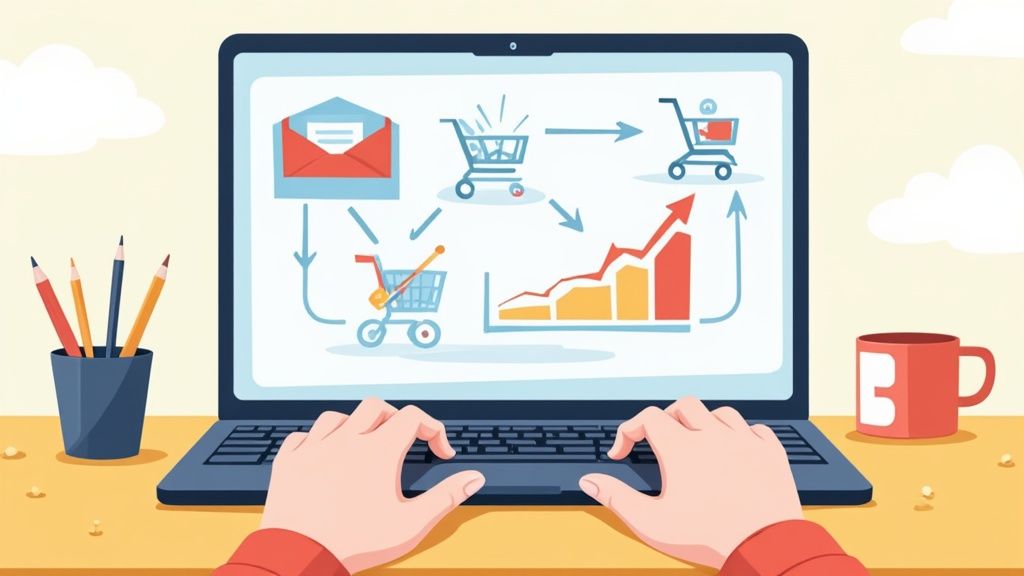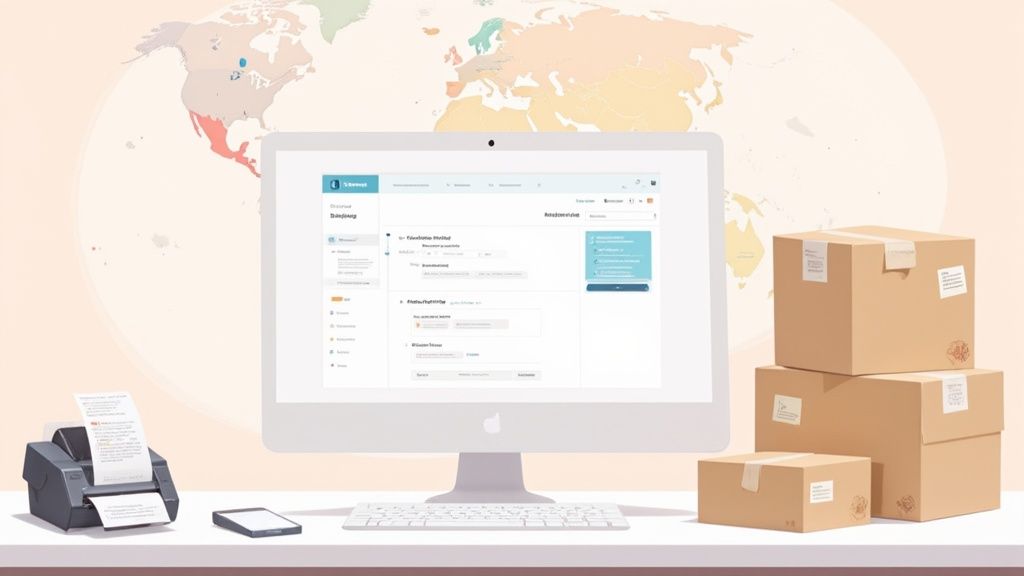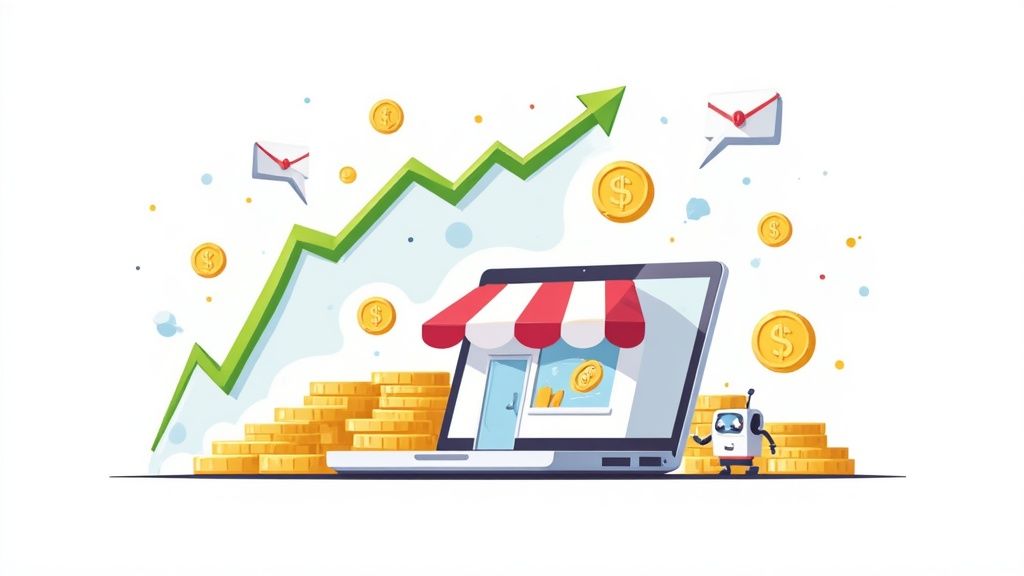
Choosing the right ecommerce platform is a huge decision, and it all starts with a solid understanding of your own business, your technical skills (or lack thereof), and what you can realistically afford.
The absolute best way to tackle this is to create a detailed blueprint of your requirements before you even start looking at flashy features or big-name platforms. Honestly, this initial self-assessment is the most critical part of the whole process.
Define Your Business Needs Before You Shop
Jumping straight into platform comparisons without a plan is like going grocery shopping when you're starving—you'll end up with a cart full of stuff you don’t actually need.
To make a smart decision, you have to look inward first and figure out exactly what your business requires to succeed. This foundational work stops you from being swayed by clever marketing and ensures your final choice actually supports your goals.
Assess Your Technical Comfort Level
First, be brutally honest about your tech skills. Are you a "do-it-for-me" entrepreneur who just wants a simple, drag-and-drop interface? Or are you a "do-it-yourself" type who loves digging into code and customizing every little detail?
There's no right or wrong answer here, but knowing where you stand instantly narrows down the field.
- No-Code Entrepreneurs: If the thought of looking at HTML makes you break out in a cold sweat, platforms like Shopify or Squarespace were built for you. They handle all the heavy lifting—hosting, security, and updates—so you can just focus on selling.
- Tech-Savvy Owners: On the other hand, if you want total control and have development resources (or you're eager to learn), a self-hosted solution like WooCommerce offers unmatched flexibility.
Analyze Your Product Catalog
Next up, think about what you're selling. The complexity of your products will dictate the features you'll need down the line. A shop selling five unique t-shirts has completely different needs than one selling custom furniture with hundreds of variations.
For instance, a clothing brand will need robust tools for managing sizes, colors, and materials. In contrast, a business selling digital downloads or subscriptions needs a platform that can handle recurring billing and secure file delivery without a hitch. Your product type is a massive signpost pointing you toward the right platform.
My two cents: Don't just make a list of your products. Actually map out how you need to sell them. Think about all the variations, whether they're digital or physical, and if you plan to offer subscriptions. This blueprint will be your most valuable tool when you start comparing platforms.
Create a Realistic Budget
Finally, let's talk money. Your budget is so much more than just the monthly subscription fee. The true total cost of ownership includes a bunch of components that are super easy to overlook. A platform that looks cheap on the surface can get expensive fast once you start adding the essentials.
Your realistic budget needs to account for:
- Monthly Platform Fees: The base subscription cost everyone sees.
- Transaction Fees: The percentage of each sale that goes to the platform and the payment processor.
- Apps and Plugins: The recurring costs for crucial tools like email marketing, customer reviews, or advanced inventory management.
- Themes and Design: The one-time cost for a premium website theme or any custom design work you might need.
By outlining all of these needs upfront, you turn your search from a confusing maze of options into a clear, methodical process. You'll know exactly what you're looking for, making it way easier to spot the ecommerce platform that's a true fit for your business.
Comparing the Top Ecommerce Platform Contenders
Alright, you’ve mapped out what your business needs. Now for the fun part: diving into the actual platforms. This is where we move from theory to reality, sizing up the big names to see which one feels like the right fit for your brand.
The ecommerce world can feel huge, but it's really a handful of major players you'll be looking at. The choice often comes down to your business size, how comfortable you are with tech, and where you're selling. For instance, WooCommerce, the free plugin for WordPress, is behind about 20.1% of all ecommerce sites, powering over 3.5 million online stores. On the other side, you have Shopify, a hosted solution that has captured 26.2% of the market, with roughly 4.65 million stores running on its platform.
While Shopify has more stores, WooCommerce is the undisputed king of customization, especially if you're already familiar with WordPress.
Hosted vs Self-Hosted Platforms
The very first decision you need to make is whether you want a hosted or self-hosted platform. This choice impacts everything—from your day-to-day tasks to your long-term costs and control over your site.
- Hosted Platforms (SaaS): Think of these as an all-inclusive deal. Platforms like Shopify, BigCommerce, and Squarespace bundle the software, hosting, security, and support for a single monthly fee. They’re built for simplicity, letting you get a store up and running fast without needing to be a tech wizard.
- Self-Hosted Platforms (Open-Source): This is the DIY route. With something like WooCommerce, the software is free, but you’re on the hook for finding your own web hosting, handling security, and keeping everything updated. It gives you ultimate flexibility but definitely requires more technical know-how.
To make this choice a bit clearer, think of it as a decision tree. Your comfort with tech, your product catalog, and your budget will naturally point you in one direction.
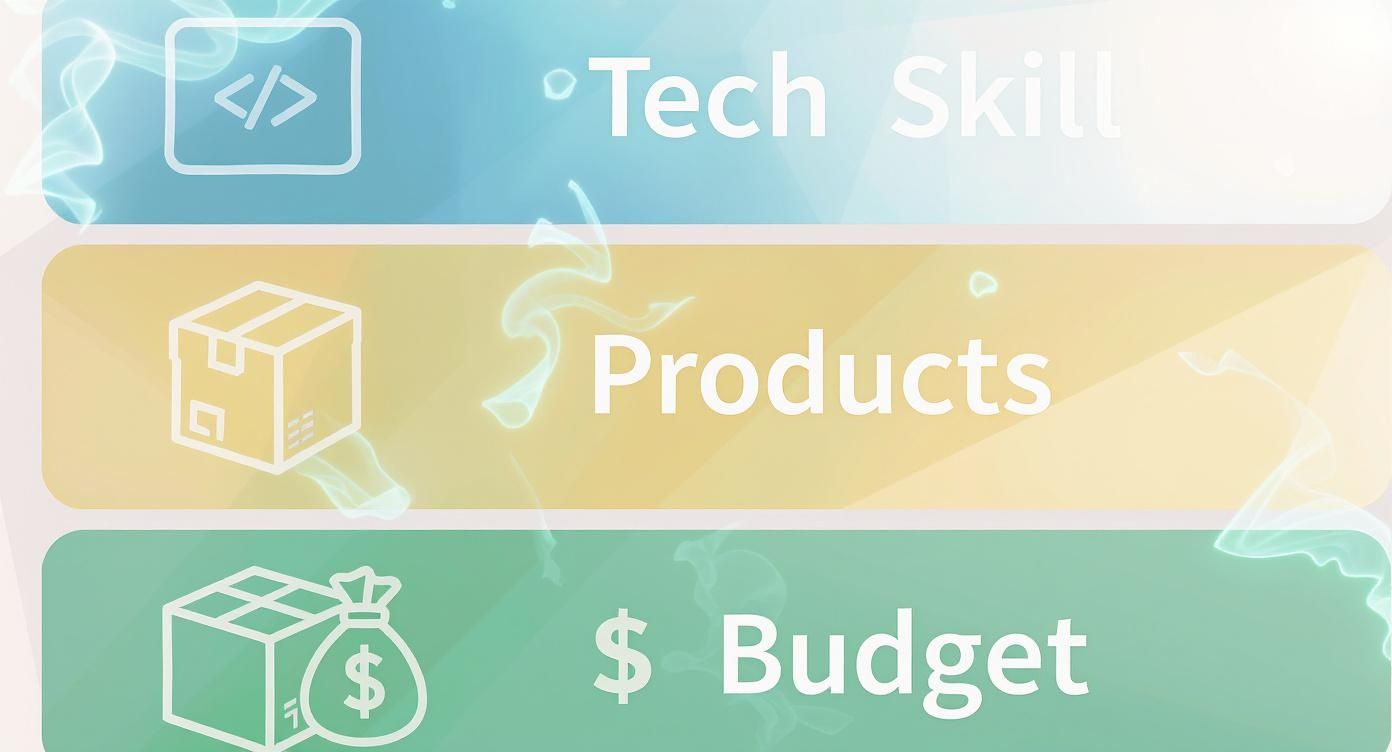
As you can see, if you're craving simplicity and speed, a hosted platform is likely your best bet. If you want total control to build something truly custom, self-hosted is the way to go.
To help you get a clearer picture of the fundamental differences, here’s a quick breakdown.
Platform Snapshot Hosted vs Self-Hosted
Ultimately, this isn't about which is "better," but which model aligns with your resources and goals.
Real-World Platform Scenarios
Let’s put this into practice and see how it works for different kinds of businesses.
Shopify: This is the go-to for merchants who want a powerful, all-in-one solution that just works. Its massive app store means you can bolt on almost any feature you can dream up, from sophisticated marketing tools to subscription boxes. It's a favorite for DTC brands that are laser-focused on growth.
WooCommerce: If your business already lives on WordPress, this is a no-brainer. It's also perfect for anyone who wants complete creative freedom. If you're not afraid to tinker with plugins and settings to create a one-of-a-kind shopping experience, its flexibility is second to none.
BigCommerce: Often compared to Shopify, BigCommerce really shines with its powerful built-in features, which can cut down on your reliance on third-party apps. It’s particularly strong for B2B businesses or stores with large, complex product catalogs. Our deep dive into https://www.ecorn.agency/blog/bigcommerce-or-shopify can help you decide which is better for your growth path.
Squarespace: This is the top choice for brands where visual appeal is everything. Think artists, boutique owners, or creative entrepreneurs. They flock to Squarespace for its stunning templates and drag-and-drop design tools, prioritizing a beautiful storefront above all else.
Choosing a platform is about more than a feature list; it's about finding a partner that fits your personality. If you're a hands-off founder, you'll love Shopify's managed setup. If you're a tinkerer at heart, you'll feel right at home with the freedom of WooCommerce.
For a broader view, it's also helpful to understand how to compare various CMS systems, as many of the principles apply directly to ecommerce. This can help you focus on what really counts for your sales and content strategy.
Uncovering the True Cost of Your Platform
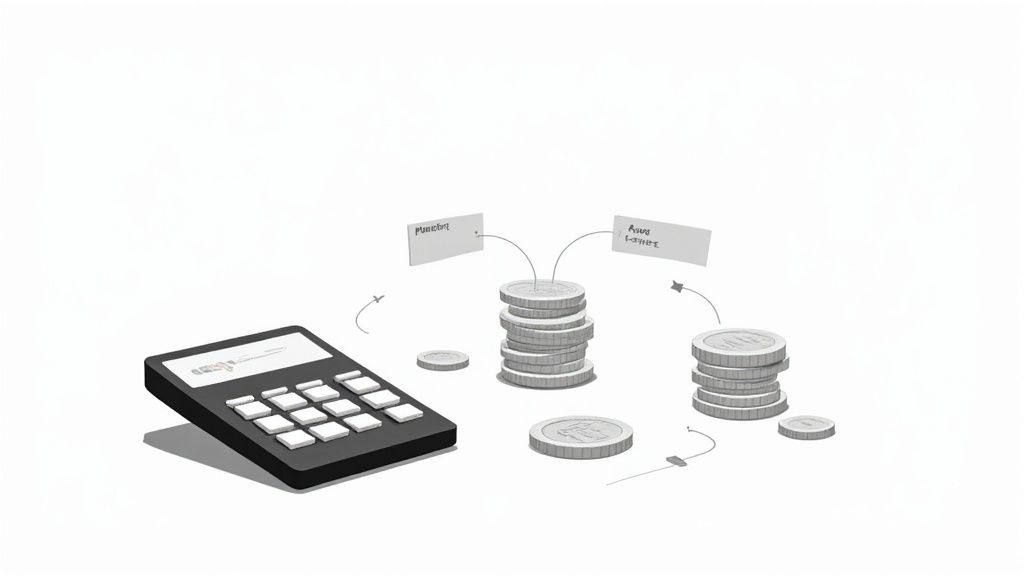
The sticker price you see on an ecommerce platform’s website? That’s just the tip of the iceberg. To get a real sense of whether a platform fits your budget, you need to look at its total cost of ownership (TCO). This number reveals what you'll actually pay over the long haul.
Too many businesses get lured in by a low monthly fee, only to be blindsided by a wave of extra costs down the road. It’s a classic trap. A platform that seems cheap at first can easily end up costing more than a premium competitor once you tack on all the tools needed for a fully functional store.
Getting honest about your finances is one of the most important parts of choosing an ecommerce platform you can grow with, not outgrow.
Dissecting Pricing Models
First, you have to get your head around the different ways these platforms charge you. Most fall into a few common buckets, and each one hits your wallet differently. That simple monthly subscription is the most obvious cost, but it's almost never the only one.
The fees that really catch new store owners by surprise are the transaction fees. These are small percentages the platform skims off every sale, completely separate from what payment processors like Stripe or PayPal take. For instance, some platforms will ding you for 2% on every single transaction unless you agree to use their in-house payment gateway.
The Hidden Costs That Add Up
Beyond those core fees, you'll find a whole world of other expenses just to get your store looking and working professionally. These are the so-called "hidden" costs that can absolutely wreck your budget if you aren't ready for them.
Let's walk through a real-world scenario. You've picked a platform with a tempting $29/month plan. Great deal, right? But then reality hits:
- Premium Themes: The free themes are bland, so you drop $180 on a premium design to actually look credible.
- Essential Apps: You need an email marketing app ($20/month), a customer reviews app ($15/month), and an advanced shipping calculator ($10/month).
- Developer Help: You want one tiny custom feature on your product page. That requires hiring a developer for two hours at $100/hour.
All of a sudden, your "affordable" platform is costing you way more than you planned, both upfront and every single month.
I see this all the time: founders underestimate the cost of the app ecosystem. A platform might have a low base price, but you will almost certainly need to invest in third-party apps for critical functions like marketing automation, customer support, and advanced analytics. You have to budget for these from day one.
When you're comparing options, grab a spreadsheet. It doesn't have to be fancy. Just list the base subscription fee for each platform. Then, start adding line items for the estimated monthly costs of every theme, app, and potential service you’ll need. This simple exercise gives you a much clearer picture of the true financial commitment, helping you make a decision that supports your long-term profitability.
How to Plan for Growth, Scalability, and Performance
Getting that first sale is a huge milestone, no doubt. But the real moment of truth for your ecommerce platform comes when you're staring down your ten-thousandth sale. This isn't just about picking a tool for today; it's about finding a partner that can handle your success tomorrow.
This concept of "scalability" gets thrown around a lot, but what does it actually mean for you?
Imagine it's Black Friday. Your traffic spikes by 1,000%. A platform that can't scale will crash, lag, and bleed sales. A truly scalable one, however, handles that surge without a hiccup, giving every customer a fast, smooth checkout. That’s the difference between a record-breaking weekend and a reputation-damaging disaster.
Understanding Key Performance Metrics
Beyond weathering huge traffic spikes, you need to dig into the day-to-day performance metrics that quietly dictate your profitability. These are the nitty-gritty details that separate the pros from the amateurs.
Here’s what you should be investigating:
- Server Response Time: How fast does the server acknowledge a user's request? Anything over 200 milliseconds starts feeling slow, and we all know that speed is a massive factor in conversions.
- Uptime Guarantees: Look for a platform that contractually guarantees 99.9% uptime or better. Every single minute your store is offline is money down the drain and a crack in your brand's reliability.
- Content Delivery Network (CDN): Does the platform use a CDN? This is non-negotiable for a modern store. A CDN stores copies of your site's assets on servers worldwide, so a customer in London gets content from a local server, not one in Los Angeles. This makes a night-and-day difference in page load times.
Thinking this far ahead is critical, especially when you look at where the market is headed. The global ecommerce market is projected to hit $7.5 trillion, a massive leap from $5.7 trillion just a couple of years back. With online sales now accounting for nearly 24% of all retail purchases and over 85% of the world's population shopping online, the need for a rock-solid, scalable platform has never been more obvious. You can check out more of these digital commerce statistics to see what this means for merchants like you.
A platform that can't scale is like building your dream house on a shaky foundation. It might look good at first, but it will collapse under the weight of its own success. Prioritize a platform built for where you want to go, not just where you are.
Planning for Business Expansion
Real scalability goes beyond just server capacity; it's about having the architectural flexibility to support your biggest ambitions.
For instance, are you eyeing international markets down the road? Your platform should be able to handle multiple currencies, languages, and regional tax rules without you needing to stitch together a dozen clunky apps.
What if you want to launch a wholesale B2B channel alongside your direct-to-consumer (DTC) site? A platform built for growth will let you manage both from a single dashboard, complete with separate pricing, product catalogs, and customer portals. Choosing a platform that can handle these kinds of pivots from the start means you won't be forced into a costly, painful migration right when your business is hitting its stride.
Why a Strong App Ecosystem Is a Game Changer
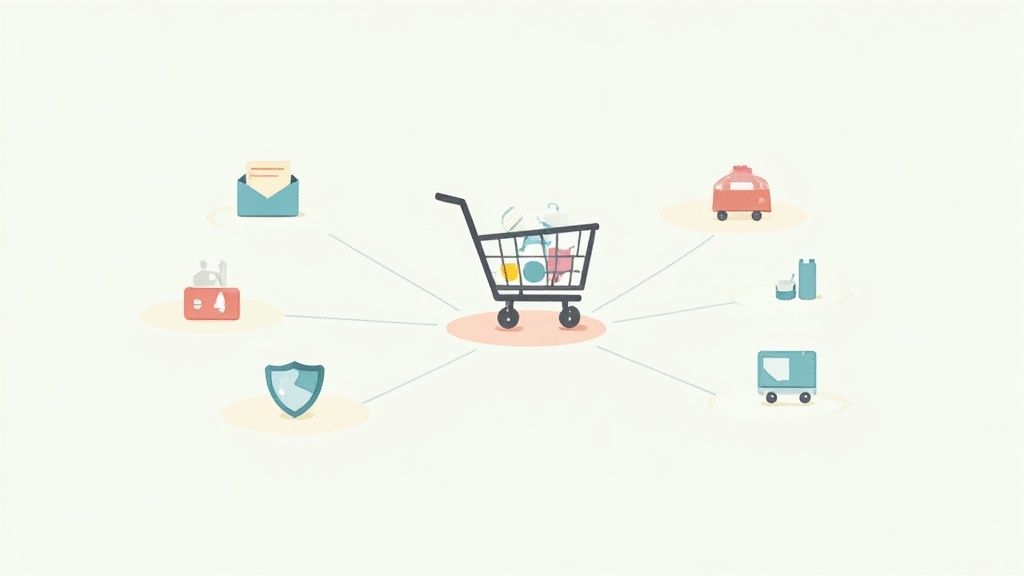
Think of your ecommerce platform as more than just a digital storefront. It’s the central nervous system for your entire business. When you’re trying to figure out how to choose an ecommerce platform, the app ecosystem isn't just a "nice-to-have"—it's one of the most critical factors you'll look at. A great platform acts as a hub, connecting every tool you need to run your business without skipping a beat.
Your platform might handle the core selling, but what about email marketing, accounting, or complex shipping logistics? This is where the app marketplace comes in. A healthy ecosystem lets you plug in best-in-class solutions like Klaviyo for email campaigns or QuickBooks for your books, all without needing a developer on speed dial.
The alternative is a nightmare of clunky, disconnected systems. You'll find yourself stuck doing manual data entry, wasting hours that could have been spent growing your business.
How to Spot a Quality App Store
Here’s the thing: not all app ecosystems are created equal. Some are bustling marketplaces filled with innovative, well-supported tools. Others are basically digital ghost towns, littered with outdated and buggy plugins. The difference between the two can literally make or break your store’s performance and your ability to adapt.
So, when you're checking out a platform's app store, don't get distracted by the sheer number of apps. Quantity doesn't mean quality. Instead, you need to look for signs of a healthy, active community:
- Top-Tier Integrations: Does the platform have official, rock-solid integrations with the big names? I’m talking about your email provider, your accounting software, and your primary shipping carriers. If the tools you rely on aren't there, that's a huge red flag.
- Recent Updates and Reviews: Pay attention to the "last updated" date on key apps. If an app hasn't been touched in a year, its developer has probably moved on. Frequent updates mean they're actively fixing bugs and adding features. User reviews are also gold—they'll tell you the real story about any recurring problems.
- Clear Support Channels: Look at the app's listing page. Is there an obvious way to get help from the developer if something goes wrong? A lack of clear support info is a sign you'll be on your own when issues pop up.
A strong app ecosystem is your secret weapon for efficiency. In fact, our ultimate guide to Shopify promotional apps shows just how much the right tools can directly boost your profits and streamline marketing.
Future-Proofing with Channel Integrations
The way people shop is always changing, and it's moving way beyond traditional websites. This is where a platform's ability to integrate with new sales channels becomes a true game-changer for your long-term growth.
Social commerce is the perfect example. Video-based selling on platforms like TikTok Shop and Instagram Shopping is exploding, with an estimated 30% compound annual growth rate (CAGR) globally. With over 28 million online stores worldwide, you have to sell where your customers hang out. Just look at the latest ecommerce platform statistics to see how fragmented the modern sales landscape is.
Choosing a platform is about betting on its ability to keep up with the future. A platform that quickly integrates with emerging channels like TikTok Shop or live streaming services gives you a competitive advantage, allowing you to tap into new audiences before your competitors even know what's happening.
Ultimately, a platform with a vibrant app ecosystem doesn't just solve today's problems. It gives you the flexibility to tackle tomorrow's challenges and jump on new opportunities as they arise, ensuring your business can evolve without being locked into a rigid, outdated system.
Got Questions? We've Got Answers
Even with the best plan in hand, a few lingering questions always seem to pop up right before you pull the trigger. We get it. This is a big decision.
Here are the most common questions we hear from founders trying to nail down their platform choice. Getting these last few details sorted will give you the clarity and confidence to make the right move.
What’s the Best Ecommerce Platform if I’m Just Starting Out?
If you're new to the game, hosted platforms like Shopify or Squarespace are almost always the smartest move. Seriously.
They're built to handle all the technical headaches for you—things like hosting, security patches, and software updates. This frees you up to pour your time and energy into what actually matters: your products and your marketing.
Their interfaces are designed for non-techies, often with drag-and-drop builders that take the fear out of building a website. Shopify, in particular, has a massive app store and a huge support community, which makes it incredibly easy to add new features as your business starts to take off.
How Big of a Deal Is SEO for an Ecommerce Platform?
SEO is everything. It's the engine that brings organic traffic—people actively searching for what you sell—to your store without you having to pay for every single click. A platform with weak SEO tools is basically putting a cap on how much you can grow without a massive ad budget.
When you're comparing your options, make sure they nail the fundamentals:
- Customizable URLs: The ability to create clean, keyword-rich web addresses is non-negotiable.
- Editable Metadata: You need full control over your page titles and meta descriptions.
- Automatic Sitemaps: This helps search engines crawl your site efficiently every time you add or change something.
- Fast Page Speeds: This is a huge ranking factor and absolutely essential for keeping visitors from bouncing.
All the big players—Shopify, BigCommerce, and WooCommerce—have these features baked in. The key difference isn't the platform, but how you use the tools they give you.
Don't fall into the trap of thinking the platform does SEO for you. It just provides the toolbox. It's still your job to build something great with it—crafting content that solves problems and targets the right keywords.
Can I Just Switch Platforms Later if I Pick the Wrong One?
Technically, yes, you can always migrate to another platform. But let me be clear: it is a massive undertaking and something you want to avoid if at all possible.
The process involves moving every piece of your digital business—product data, customer lists, order histories, and all your website content—to a completely new home.
It's complex, it's often expensive, and it's time-consuming. Worse, there's a very real risk of tanking your SEO rankings if you don't manage the URL redirects flawlessly. While switching is an option, putting in the effort now to choose the right long-term partner will save you an incredible amount of pain and money down the road.
Ready to build a powerful Shopify store that scales with your ambition? The team at ECORN specializes in Shopify development, design, and conversion rate optimization to help brands like yours thrive. Whether you need a full site build or expert guidance to boost performance, we're here to help. Explore our Shopify solutions and see how we can accelerate your growth.






